Please donate £1 to support your parish
See below for details


3 Edition 32

Sunday Vatican approves Walsingham Feast



The Light of Faith Cricket tour comes to the UK
12



Please donate £1 to support your parish
See below for details


3 Edition 32

Sunday Vatican approves Walsingham Feast



The Light of Faith Cricket tour comes to the UK
12


Central to the Instrumentum Laboris is the theme of communion, participation, and mission. It calls for a renewed focus on fostering deeper relationships within the Church and with the broader world.
The Vatican has recently unveiled the Instrumentum Laboris, a pivotal document guiding the Synod on Synodality. The second session of the Synod will take place in Rome between 2-27 October 2024. This document, a labour of extensive global consultation, outlines the path for the Catholic Church to deepen its commitment to unity, participation, and mission in a rapidly changing world.
The Instrumentum Laboris, or working document, stands as a testament to Pope Francis's vision of a more inclusive and listening Church. Grounded in the voices of laypeople, clergy, and religious from diverse backgrounds, it encapsulates the collective wisdom and hopes of the global Catholic community. The process leading to this document involved unprecedented engagement, with over a hundred thousand consultations worldwide, reflecting a truly synodal approach where every voice is valued. Central to the Instrumentum Laboris is the theme of communion, participation, and mission. It calls for a renewed focus on fostering deeper relationships within the

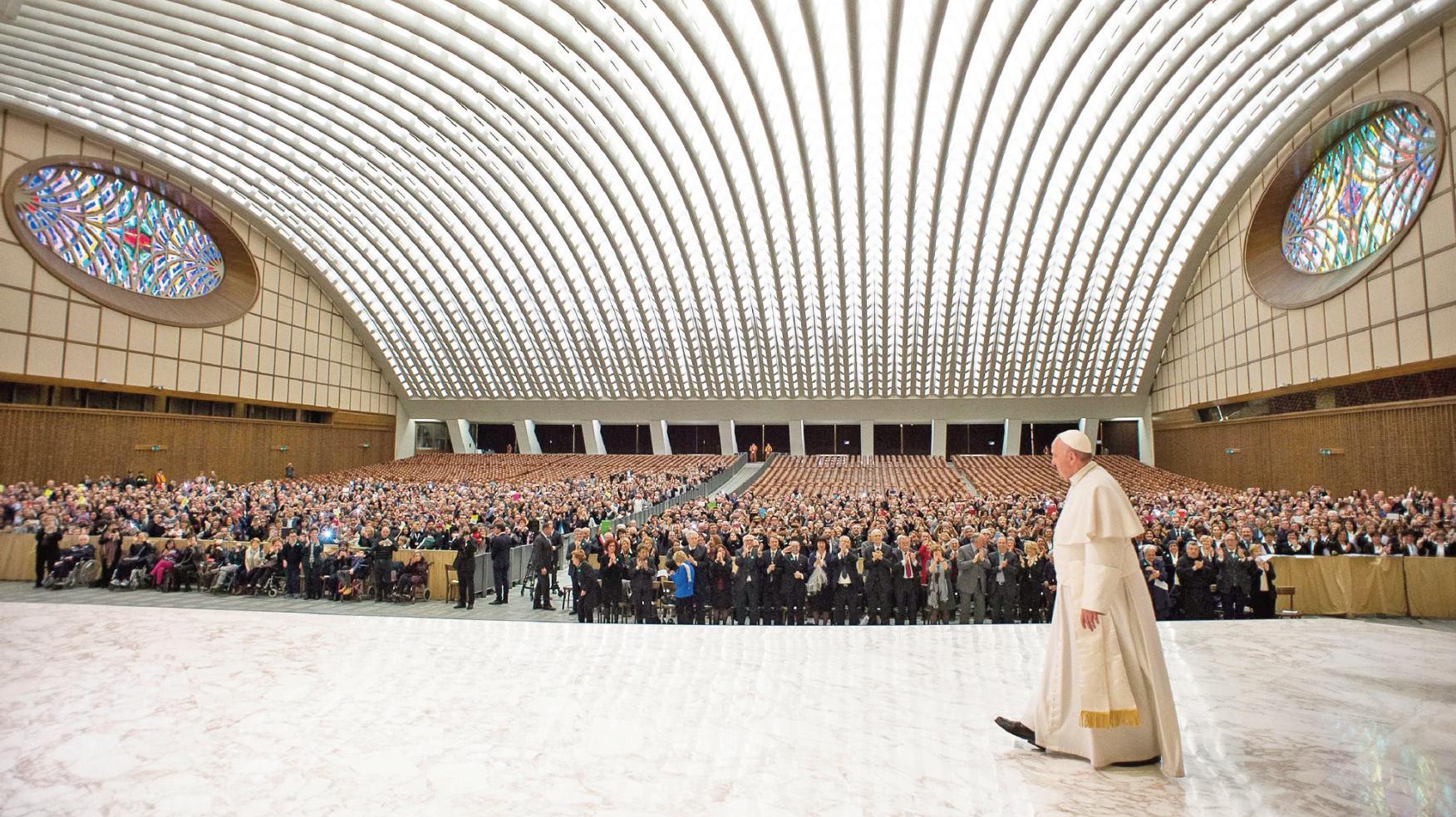
Church and with the broader world. The document emphasises the need for inclusivity, urging the Church to reach out to marginalised communities, embrace diversity, and ensure that all members feel valued and heard. This spirit of inclusivity is envisioned to strengthen the Church’s mission in the modern world, making it more relevant and responsive to contemporary challenges.
Moreover, the document highlights the importance of active participation by all the faithful. It encourages a move away from a hierarchical model towards a more collaborative and participatory Church. This involves empowering laypeople, especially women and young people, to take on leadership roles and contribute meaningfully to the life and mission of the Church. Such an
approach is expected to revitalise parishes and communities, making them vibrant centres of faith and action.
The Instrumentum Laboris also addresses the Church’s mission in the world. It calls for renewed evangelisation efforts that are rooted in listening and dialogue. The document underscores the need for the Church to engage with contemporary issues such as social justice, environmental stewardship, and human dignity. By doing so, the Church can offer a prophetic voice that speaks to the hopes and struggles of people today.
Overall, the Instrumentum Laboris is a hopeful and forward-looking document. It sets the stage for a transformative Synod that seeks to
renew the Church’s commitment to being a beacon of hope, unity, and love in the world. As the Church prepares for this significant gathering, the themes of communion, participation, and mission outlined in the Instrumentum Laboris promise to inspire a new chapter of growth and renewal in the Catholic Church.
For further information use the QR code below or search ‘Instrumentum Laboris Synod’ online

If you have been given the Catholic Post for free in your parish, PLEASE would you be able to donate £1 to your parish for it, or even £10 per year!


CONTACT US:
The Catholic Post is published by its owners Bellcourt Ltd and is wholly independent of and separate from any previous newspaper. The Catholic Post is published on the last Sunday of the month previous to publication date.
EDITOR: Nick Layton
email: editor@catholicpost.co.uk
ADVERTISING: Charlotte / Bellcourt Ltd. 01440 730399 charlotter@cathcom.org
DESIGN & LAYOUT:
David Lodge, davidl@cathcom.org
PUBLISHED BY:
Bellcourt Ltd. N2 Blois Meadow Business Centre, Blois Road, Steeple Bumpstead, Haverhill, Suffolk CB9 7BN 01440 730399
ARTICLES TO:
The Catholic Post email: editor@catholicpost.co.uk or davidl@cathcom.org
Please send articles for publication by email, supplying any photos separate to the text We welcome contributions
Here are answers to some basic questions about writing for The Catholic Post How long should articles be?
Usually it seems to work out best if contributors simply say what they have to say and let us worry about finding a spot for it in the paper. What is the submission procedure?
Please send as a Word file attached to an e-mail. To submit articles for publication, send to editor@catholicpost.co.uk
Charts, graphs, and photos should be submitted as separate PDFs. Electronic photos should not be embedded or pasted into a Word document as this reduces their quality.
Photographs and Illustrations
Photographs and Illustrations should be supplied electronically as high resolution JPEG (*.JPG) files).
Photographs and illustrations should be sent in colour with a resolution of 300 dpi and a minimum size of 100 mm x 100 mm when printed (approx. 1200 pixels wide onscreen).
Computer print-outs are not acceptable. Screen captures are not ideal as they are usually not very high
Parental permission should be sought before submitting photographs of minors. Source information -
DW = Diocesan Website.
ICN = Independent Catholic News
Views expressed in The Catholic Post are not necessarily those of the editor Last date for copy is the LAST DAY of the month prior to publication.

It
certainly puts into perspective some of the things we priests today typically complain about having to do that have nothing
to do what we were ordained for.
to do with why we were ordained. At least we are free
How many people in the average parish look forward to their Sunday celebration of the Mass, especially if they aren’t able to go during the week? On the other hand how many go reluctantly because they have to, or because of the struggle it takes to get the family ready and out of the door, or (if they are being honest) because they find Mass boring? I suspect there may be far more of the latter than the former, but even amongst the reluctant there really isn’t any actual personal cost involved in going to Mass.
The 16th century may seem dim and distant history to us now, but the consequences for Catholics when Henry VIII broke with the Church of Rome continued in one form or another until as recently as the 1800s. The Catholic Emancipation Act of 1829 reduced and eventually removed the restrictions that had been placed on Catholics by the various Uniformity Acts which had banned them from holding civil or military offices and seats in parliament, and from inheriting property. Even to this day, however, English monarchs can’t be Catholic or be married to a Catholic.
The persecution of the Church during the reigns of Henry VIII and then Elizabeth I, saw large numbers of Catholic laypeople martyred for their faith rather than accept the prohibitions imposed on them. I’m sure we struggle to understand how someone could remain so firm in their faith convictions faced with the horrors of a martyr’s death - when they could have escaped that fate by even a pretence of conversion. Who would have known? Obviously God would have, and that’s what made the difference. In their place would we have remained so stoic, so resolute, in our
faith? Thankfully it’s a question we will only ever have to answer in theory because hopefully we will never be faced with such a situation - though it has only been five hundred years since we might have been.
During the years of persecution, priests studied abroad and returned to this country to serve the spiritual needs of the faithful knowing that as soon as they came ashore they faced the risk of arrest and of being hung, drawn and quartered simply for being a priest let alone celebrating Mass. The “life expectancy” of priests in this country at the time was about six months. Imagine the determination of men spending years studying for the priesthood knowing that they could be martyred, and in such an horrific way, within a matter of months of setting out on their ministry.
It’s hard to believe that my parish church in Yarm was built at a time (1860) when the Church in this country was only just beginning to emerge from three centuries of persecution and civil restriction, when the freedom to worship could still not be taken for granted. Indeed, the Meynell family, who built the church, originally had an illicit chapel in their house where local Catholics could gather for Mass. The three reredos panels that used to hang on the wall behind the altar of that chapel are now displayed in the parish church as a reminder of those times and that we should never take the practise of our faith for granted.
Recently, I was watching a documentary on the television that focused on a large country house which, like the Meynell’s, was owned for centuries by a Catholic family. The programme
looked at various features of the house including a “priest hole” where, in Reformation times, itinerant priests could hide if government forces arrived to search the house. It was basically concealed within the walls and was not much bigger than a modern phone box on its side. As claustrophobic as it was, a priest might have to remain hidden there for days. There was I, comfortably seated in my armchair watching the television, but during those years of priestly persecution and martyrdom, it could have been me hiding in that “priest hole” in fear of my life. It could also have been me stepping ashore on the coast of England, fresh from the seminary, and facing arrest and execution simply for being a Catholic priest. It certainly puts into perspective some of the things we priests today typically complain about having to do (fund-raising, property maintenance, administration, etc, etc.) that have nothing to do with why we were ordained, but at least we are free to do what we were ordained for.
The point I set out to make in this reflection is that our religious freedoms, and in particular our freedom to worship as Catholics, were dearly won. The danger is that they can be easily taken for granted and all the more so the further removed we are from the age of the martyrs. Nobody is going to arrest you for going to church; priests are not going to face execution for celebrating Mass and the sacraments; but do we ever reflect on the religious freedoms and privileges we now enjoy in that regard? We may struggle to get out of bed on a Sunday morning, or to get everyone out of the door and on the way to church, and the traffic on the way or the parking when we get there may be a pain, but if that’s the only “cost” to us then in reality, and certainly compared to those dark times of religious persecution, we – priests and people - have little to complain about. We certainly don’t expect to have to pay with our lives for attending church on a Sunday morning as so many, martyred for their faith, have done in past centuries.
ICN/CBCEW
“Given the historic importance of this shrine for the Church in England and Wales, dating back just over one thousand years, and given the growing devotion to Our Lady of Walsingham to which you attest, the Dicastery has decided that, by way of exception, your request may be granted."
The Vatican has granted permission for Our Lady of Walsingham to be celebrated as a new Feast in the dioceses of England, starting this year on 24 September.
Cardinal Arthur Roche, Prefect of the Dicastery for Divine Worship and the Discipline of the Sacraments, wrote to Cardinal Vincent Nichols, president of the Bishops' Conference, in response to his request last year that the Obligatory Memorial of the Blessed Virgin Mary of Walsingham be raised to the rank of Feast.
He explained that normally it wouldn't be moved but an exception would be made. He said: "Given the historic importance of this shrine for the Church in England and Wales, dating back just over one thousand years, and given the growing devotion to Our Lady of

to which you attest, the Dicastery has decided that, by way of exception, your request may be granted."
The Shrine of Our Lady of Walsingham was established in 1061, according to the text of the
Last month’s front cover of the Catholic Post featured Bl Carlo Acutis and shared the news that the London-born teenager, having died at the age of 15 is to become a Saint.
One reader contacted us to say that in the article, a list of names of others whose actions had been recognized by decree, included a duplicate name:
“The degrees also recognized the heroic virtues of the Servants of God Guglielmo Gattiani (Italian Capucin priest, 1914-1999), Ismaele Molinero Novillo (Spanish layman, 1917-1938), and Ismaele Molinero Novillo (Italian layman, 1911-1974)”
The name of the Italian layman who should have appeared third in the list above was Enrico Medi.
His biography on ofm.org records that he was a man of hope and faith, of culture and science. Husband and father, he worked as a university lecturer having graduated in Terrestrial Physics and whilst working in education, moved also into politics, becoming a representative in the first Parliament of the Italian Republic.
He is recognized for his dedication to and exercise of the Christian virtues. Faith was at the heart of his life and he combined fidelity to Catholic doctrine with a thorough knowledge of the human sciences. Very much a man of our time, he died of cancer, surrounded by a great reputation for holiness in Rome on 26 May 1974.
For more information on Venerabile Enrico Medi go to ofm.org/en/venerable-enricomedi.html
My mother was fifteen years old when she accompanied my grandmother to visit an old family friend. This old lady was very good, but was physically unattractive and had a specimen Pekinese dog. Although obediently going along, my mother found visiting difficult.
At the end of their visit, the old lady got up to say goodbye. My mother recounted the story: “Suddenly the old lady wasn’t thereand in her place was a radiantly beautiful girl - all light, so much so that her features were not clear. She was dazzling! Then, the old lady was back as herself…. I thought that she would think me rude for having stared at her, but she didn’t seem to notice! What had seemed to last a minute or two, must have been just a few seconds.”
As they walked down the road granny was very thoughtful and my mother wondered whether to tell her what she had seen.
After a few moments granny said “You know, I had the most extraordinary experience just now” and she told my mother exactly what she too had seen.
They believed that God had showed them the fullness of beauty of the old lady’s soul.
Prayer for the elderly:
Take my (his/her) hand, O Blessed Mother, Hold it firmly lest I fall, I am nervous when I’m walking And to thee I humbly call. Guide me over every crossing, Watch me when I’m on the stairs, Let me know you are beside me, Listen to my fervent prayers. Bring me to my destination
Pynson Ballad, when devout noblewoman Richeldis de Faverches asked in prayer for inspiration so that she could carry out a special work in honour of Our Lady.
The Pynson Ballad says that Our Lady appeared to Richeldis and showed her in spirit the House of the Annunciation where the Angel greeted Mary in Nazareth, and asked her to build a replica in Walsingham as a perpetual memorial of the Annunciation.
Cardinal Roche said he hoped that the new Feast day would strengthen the faithful: "May this yearly celebration be a source of renewed grace and evangelical endeavour for the Church in England and Wales, as, imitating Mary, the faithful may ever more become disciples of her Son, receive the message of the Gospel, treasure it in their hearts and reflect on it in their minds".
The Feast will be in the National Calendar for England as the National Marian Shrine in Wales is Our Lady of Taper.
Find texts for Mass, the Lectionary and the Liturgy of the Hours on the Liturgy Office website: https://liturgyoffice.org.uk/
Safely every single day, Help me with each undertaking, As the hours pass away. And when evening falls upon us, And I fear to be alone, Take my hand, O Blessed Mother, Once again and lead me home.
www.crownofthorns.org.uk
email: office@crownofthorns.org.uk
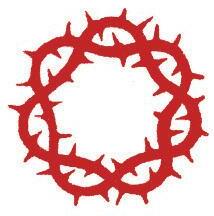
Promoting the Holy Rosary in the U.K. & throughout the world to bring hope, comfort and peace to the marginalised, the oppressed and the imprisoned, enabling wounded hearts to find healing and shattered lives to find breath and space to renew.
Supporting priests and chaplains in their ministry, outreach and welfare.
“I am the Lady of the Rosary. Continue always to pray the Rosary every day.” (Our Lady at Fatima) www.crownofthorns.org.uk
email: office@crownofthorns.org.uk
Phone: 01342 870472
Registered charity no: 1042751
dioceseofleeds.org.uk Dr Gardner said, ‘We are delighted to be working with Leeds Diocese on this beautiful project, which is testament to the shared sense of mission to Care for Creation in hope and love for our brothers and sisters. We will take care of the Ginkgo seeds and seedlings until they are strong enough to be planted across Leeds Diocese and will plant one at the Laudato Si Centre in Salford Diocese as a living statement for the work we all do.’
“We are delighted to be working with Leeds Diocese on this beautiful project, which is testament to the shared sense of mission to Care for Creation in hope and love for our brothers and sisters.”
A joint Sustainability project between the Dioceses of Leeds and Salford is sowing the seeds of Hope!
The 2025 Jubilee of Hope will also be the 80th anniversary of a miracle of nature which took place in the devastation of post-war Hiroshima. In August 1945, Ginko Biloba trees within two thousand metres of the nuclear bomb blast area survived. Against all the odds, and although scorched and damaged, the trees started to bloom and produce seeds again.
Leeds Diocesan Justice and Peace Commission member Sean Morris gave the appropriatelynamed Dr Emma Gardner, Head of Environment at neighbouring Salford Diocese, some seeds from one of the trees still growing in Hiroshima. Over the next three years or so, Salford’s Laudato Si’ Centre has the capacity to nurture these seeds into saplings until they are sturdy enough to plant out.
The seedlings will represent hope for Peace as well as making an environmental statement. The Vatican was actually the first State to ratify the Treaty for the Prohibition of Nuclear Weapons and the Pope has visited Hiroshima. Manchester and Leeds Councils are amongst hundreds of local authorities to pass resolutions supporting the Treaty.
Sean Morris works for Manchester City Council and has long had connections with ‘Mayors for Peace’, which is led by Hiroshima and Nagasaki and of which Manchester is a Vice-Presidential city. Sean explained, ‘I worked with Hiroshima to bring seeds first to Manchester and then to another 20 or so other towns and cities. One of them is my home council of Hebden Royd Town Council, and one of their gingko seedlings is planned for my home parish of the Church of the Good Shepherd in Mytholmroyd. That gave me the idea to look at bringing the project to churches and schools.’
Sir John Battle, Chair of the Diocese of Leeds Justice and Peace Commission said, ‘These seeds and the saplings that will grow from them act as a sign of environmental hope: that
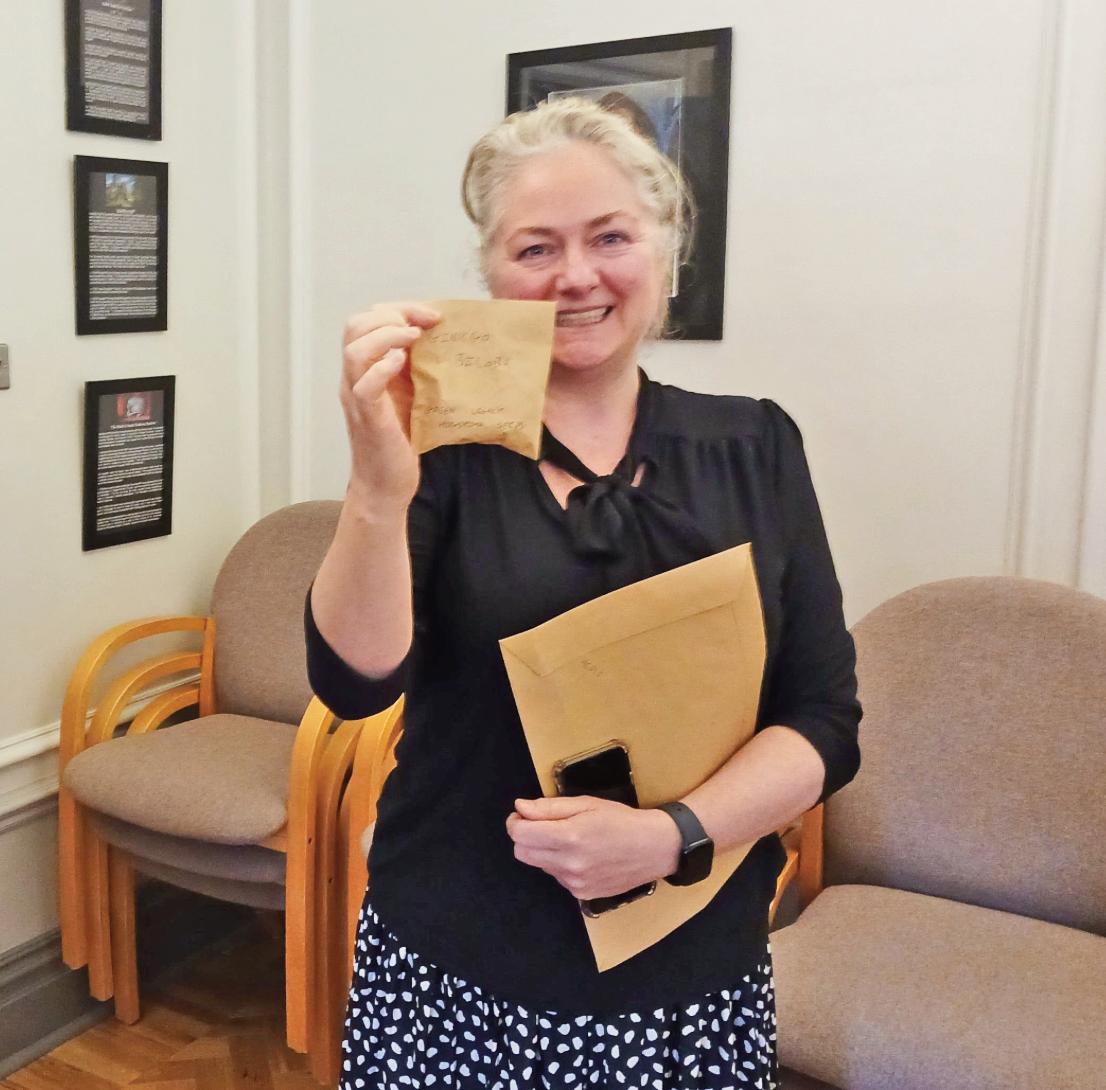
nature can recover from devastation. This hope is something that we all desperately need at this time. These trees will also provide an opportunity to discuss the overall morality of nuclear weapons, in the light of the Church’s recent teaching, which has become only too relevant again because of the war in Ukraine.’
Schools and parishes across both Dioceses are being encouraged to register their interest in taking one of these special saplings, which may be of particular interest to those with – or working towards – a CAFOD LiveSimply Award. For further information, please email jandp@dioceseofleeds.org.uk
educatemagazine.com
“It just shows utter commitment, her resilience and her determination to do well. We’re really, really proud of her.”
A former student at St John Fisher Catholic High School in Wigan has received a certificate from Wigan Council for achieving 100 per cent attendance consistently for 12 years – her whole school experience.
Libby Gibson left St John Fisher last summer without having one day off school since she started in reception class at St Mary and St John Catholic Primary School. This equals to 2280 days of school attendance.
Headteacher of St John Fisher, Mrs Rigby, and the school’s attendance and punctuality officer, Mrs Bates, presented Libby with her award.
Speaking about Libby’s achievement, Mrs Rigby said: “To have full attendance all the way through her education career is a magnificent achievement and it also, I think, sets her up for the future because not only has she never missed a day’s learning; it also trains her up for the world of work.
“It just shows utter commitment, her resilience and her determination to do well. We’re really, really proud of her.”
Mrs Rigby said that she also shared Libby’s achievement with younger students at St John Fisher.
She added: “They are amazed. Libby is an inspiration to others.”

svp.org.uk
Everyone was moved not solely by the centre’s ability to care for its community in such large numbers, but to do so with such love, compassion, and dignity
There were 15 students from across the North East, from the Universities of Durham, Middlesbrough, Newcastle, Northumbria, and York, as well as young adults form our parishes and camps. Many of these students had not met before the action day, yet by the end of the day there was a strong feeling of fellowship and a desire to work together in future to live out their calling as Vincentians: to seek and serve those in need.
Many of the young adults were moved by the centre’s ability to not only provide pivotal services to the community, but to have created an atmosphere of love and dignity where those on the very peripheries of society are included and truly cared for. Some of the services that were highlighted on the day were the vast
foodbanks supporting the city, the projects dealing with elderly loneliness, the open larder, as well as its clothing pantry that allows those in need to not only get the vital clothing they need, but to have the option of choice at an affordable price. Everyone was moved not solely by the centre’s ability to care for its community in such large numbers, but to do so with such love, compassion, and dignity.
The Membership Support Officer for Hexham and Newcastle also joined us for the day, Deacon Patrick Rutherford, offering a spiritual accompaniment to the day, as well as connecting with students in how they can better work with their local parish SVP conferences. This is key in keeping our young adults engaged in social action: to provide a community of peers, but also connections to their own local community and its needs.
This is the second of the Young Adult (SVP1833) communities’ Action Days, where we gather for Mass and Prayer, then to support the projects of the SVP through a day of volunteering, then finally a trip to the pub for some time of fellowship! So, if you are you 1835 and want to engage in social action at university, in your parish or at home, then please contact youngvincentians@svp.org.uk for more information about our next event.
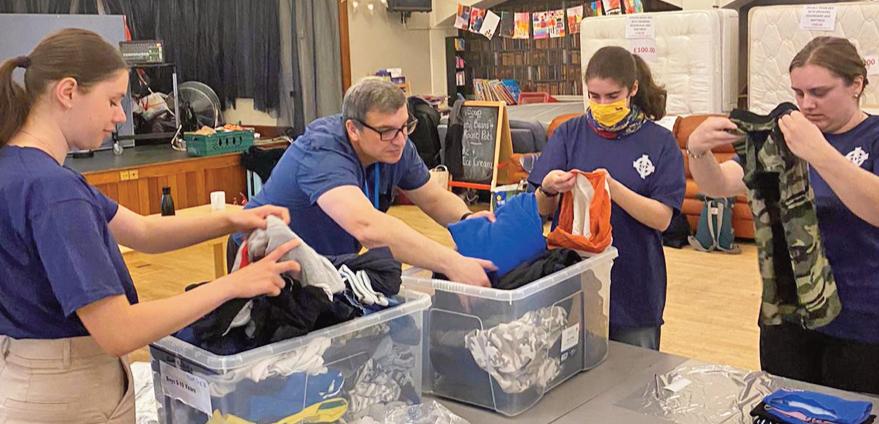



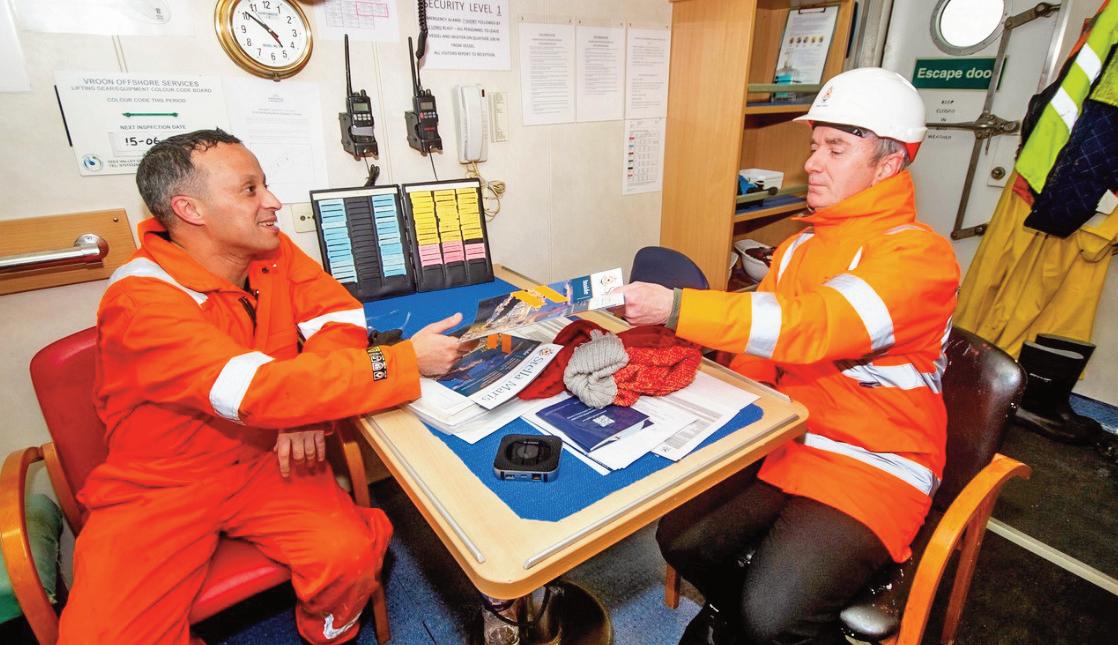
abdiocese.org.uk
Being a seafarer is a tough job at the best of times - but current conflicts are making it worse with the risk of being hit by bombs or abandoned by shipowners, left in distant ports without money or the means to get home.
“Some of the seafarers I meet have travelled through the conflict area of the Red Sea, with its risks of attacks from Houthis, then have sailed on to the Black Sea with its own dangers, given there is no agreement on maritime safety,” says Stella Maris’ Odesa port chaplain Fr Alex Smerechynskyy in Ukraine.
As a result of the conflict in Gaza, ships sailing through the Red Sea face the threat of Houthi missiles, drone attacks and raiding parties.
Since last
Ships bound for Ukraine are now regarded by Russia as potential carriers of military cargo, making them legitimate targets. This follows the collapse of the UN Black Sea grain initiative to create a safe corridor for ships carrying Ukrainian food and fertilizer.
Catholic charity Stella Maris (formerly called Apostleship of the Sea) is one of the few maritime charities with chaplains based in Ukraine. They carry out ship visits from the southern port city of Odesa. Here they work with seafarers on the frontline, witnessing the impact it is having on them.
Many shipowners are not allowing crew members to go ashore during their time in Odesa, for security reasons. So visits on board ships by the Stella Maris team there are proving increasingly important in countering the isolation and loneliness that seafarers often experience.
“Seafarers have signed on knowing the risks and receive additional pay as a result, but there is no respite for them and that has an effect,”
they can witness the drone attacks on the port and the city at close hand. This only adds to their stress and anxiety.”
Being a seafarer is a tough job at the best of times. You are away from home for months, you work long hours, and you face possible accidents at sea. But ships being hit by bombs or missiles is an additional problem facing seafarers currently – and not the only one. There is now an alarming rise in cases of seafarers abandoned by shipowners: left in distant ports without money, support, or the means to get home.
Deacon Joe O'Donnell, Stella Maris’ Senior Area Port Chaplain for Scotland helped an Indian crew recently. They had not received their wages for several months and were abandoned in Troon in south-west Scotland. "We supplied groceries, clothing, and free mobile phone SIM cards so they could talk to their families back home," he said. "The crew were also under a huge mental strain, with no money, no means of getting home and absolutely no idea what their future is. So we offered them pastoral support and
reassurance. Following our intervention, the crew was paid and returned home."
What happens on global shipping routes affects us all because much of the food and other products in our shops arrive on ships. That is everything from fish and fruit to computers and cars. We rely on seafarers and fishers perhaps more than we realise.
This year's Gospel for Sea Sunday (Mark 6: 713) emphasises the importance of service and hospitality for strangers as a sign of Christ's love. In this reading, Jesus instructed the disciples to take almost nothing with them - so they had to rely on the providence of God on their travels - and the generosity of the people they would stay with on the journey. Those people would be strangers to them - but the disciples were reliant on their hospitality.
When seafarers arrive in a foreign port, they are strangers, often thousands of miles from home. Stella Maris’ chaplains and volunteer ship visitors welcome them, listen to their concerns, and help provide what they need. The Stella Maris teams answer Jesus' call to give hospitality to the stranger. They put their faith into action.
“I’m quite intrigued. He’s the patron saint of motherhood and pregnant women, so he’s probably a saint much beloved of people, particularly women.” dioceseofsalford.org.uk
A Lancashire parish is celebrating a wonderful new connection to its patron saint, after a step back into one woman’s family history brought about a rare discovery.
The Parish of Our Lady of Lourdes and St Gerard Majella in Lostock Hall has recently welcomed what is believed to be a relic of the 18th-century Italian saint – Gerard Majella –following its chance discovery at a home in Sheffield.
Nicky Woods came upon this rare find when looking through the personal items belonging to her late mother.
She explained: “My mother died in 2013 but my father died in 1958, so she’d been a widow for a very, very long time and she kept this little box of very special things.
“There were letters from my father from when they were courting and such really little, personal things, which I always felt I couldn’t look at yet.
“Eventually, I braced myself to have a look and in the bottom, there was a small, circular box with this relic in.”
Thanks to a background in archaeology and an early childhood spent listening to Latin Mass, Nicky’s grasp of the Latin label in the box enabled her to identify the item as a tiny piece of bone from 18th-century saint, Gerard Majella.
St Gerard Majella
Born in 1726 in the Kingdom of Naples, Gerard Majella is today venerated as the patron saint of mothers, expectant mothers, children (particularly unborn children), good confessions, and the falsely accused.
In 1749, he joined the Congregation of the Most Holy Redeemer – known as the Redemptorists – and is remembered for his dedication and service to others, as well as numerous miracles. One such miracle tells the story of a visit St Gerard paid to a local family. During this visit, he dropped his handkerchief and when one of the girls rushed to return it, he told her to keep hold of it as she might have need of it one day. Years later, the girl – now married – was on the
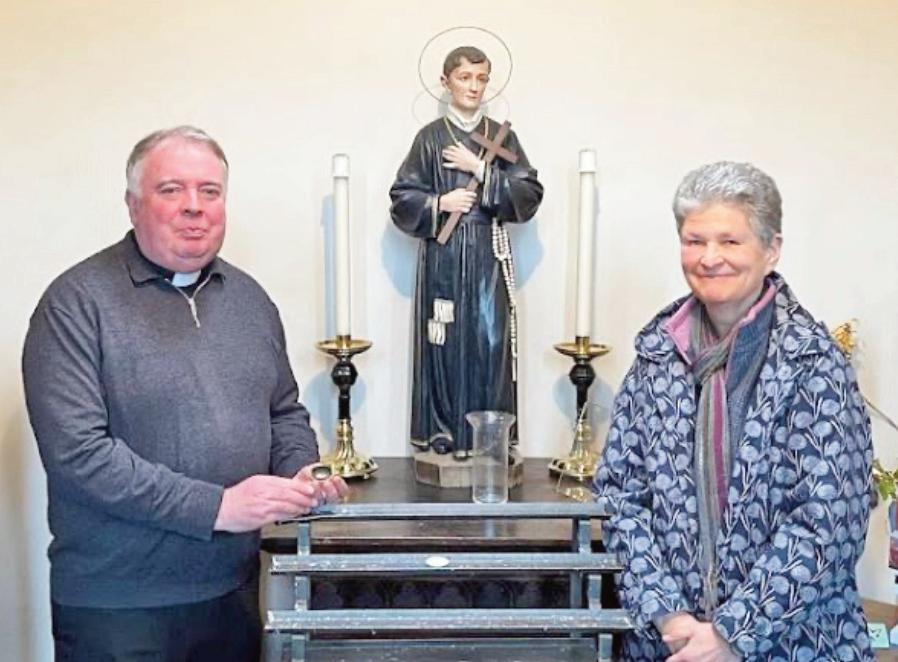
verge of dying in childbirth and she asked the handkerchief to be brought to her. Almost immediately after receiving it, her pain stopped and she gave birth to a healthy child.
St Gerard Majella died on 16 October 1755, aged 29, and was canonised in 1904.
Reflecting on this little-known saint, Nicky said: “I’m quite intrigued. He’s the patron saint of motherhood and pregnant women, so he’s probably a saint much beloved of people, particularly women.”
Rehoming the relic
After making her discovery, Nicky was then faced with the decision of what to do next – as well as questions of how what is understood to be a tiny bone fragment of an Italian saint ended up in her mother’s possession.
She said: “Her family and my father’s family were both Roman Catholic, but I wondered if it had actually come from his family – as my mother’s family were, I think, slightly less devout in that particular way. I suspect my mother may have kept it in devotion to my father most of all because she didn’t have it with her own prayer books or things, but rather in this little memory box.
“For me, relics aren’t part of my own personal spirituality or devotion, so I thought I should
put it in the hands of the Church and an appropriate parish where they will be good custodians of it for the future.”
As such, Nicky began to research churches in and around the area where her father grew up – near Brownedge, in Lancashire – and came upon the parish of Our Lady of Lourdes and St Gerard Majella.
Located in Lostock Hall, this beautiful parish was consecrated in 1910, just a few years after Pope Pius X introduced the feast of the apparition of the Immaculate Virgin of Lourdes and canonised St Gerard Majella.
These important events inspired the dedication of the church, but could also explain how this remarkable item arrived in the possession of Nicky’s family, following the tradition of disseminating relics to relevant parishes throughout the world after the canonisation of a saint.
Although impossible to trace the origins of the find or its connection to the church, parish priest – Fr Mark Harold – was delighted to hear from Nicky and to welcome her and her discovery to the parish with prayerful ceremony.
He said: “We’re very grateful to receive it. It came completely out of the blue, but I was
delighted and thought it was a wonderful thing for our parish to have.
“The tradition of keeping relics is about being in touch with holiness. If you think about it in terms of a loved one, we keep safe things belonging to our loved ones: something belonging to your grandma or grandad becomes precious.
“And so it was with saints. It was something belonging to them that reminded us of them, brought us closer to them, and closer to holiness, and that’s really special.”
The reliquary is now housed at the parish, where the hope is to enable people to spend time with it in prayer.
Fr Mark said: “As Catholics, we’re into tangible signs – things we can touch, see, and smell.
“It reminds us of the Incarnation, that the Lord became flesh. This isn’t just some sort of ethereal, nice idea, it’s a concrete incarnational thing that God came to earth, came to us, and we can touch, and sense, and feel.
“It’s a sensory thing that connects us in our physical realm to the realm of God.”
emmaus.org.uk
To date, the Emmaus Partnership has already completed the first 5 of 9 phases of building projects in schools in Masaka, fitting a total of 47 x 20,000 litre water-harvesting tanks plus guttering and appropriate filters.
The Emmaus Partnership Project has worked hard to alleviate water and sanitation problems in the hard-pressed Masaka district of SouthWest Uganda. The Emmaus Partnership comprises the Masaka and District Land Care Chapter (MADLACC), an agro-forestry group in Uganda, WaterHarvest, a water-harvesting charity in Winchester who have provided a large percentage of all funds allocated thus far and 33 Catholic Schools in the Diocese of Clifton, UK led by St Edward’s Roman Catholic SEMH School in Hampshire.
“As teachers in Catholic schools we believe passionately in the collective integrity and power of young people: a power that can be harnessed and be brought to bear on some of our planet’s most pressing challenges,” said Stephen Whelan, Mission and Ethos Lead at St Edward’s.
“The work we are doing in Uganda is far greater than a charitable venture. It is about living out the values of Fratelli Tutti; it’s about empowering children themselves to break the cycle of poverty and to tackle some of the effects of climate change; it’s about inviting Catholic communities to work together with a UK not for profit charity. on something that lives out in a practical way the very principles of Catholic Social Teaching. In short, it’s about Faith in Action.”
In a clear commitment to a preferential option for the poor, the Partnership is committed to empowering children in 22 primary and secondary schools in the Masaka area, a few miles north of the equator. MADLACC provide saplings and then train these young people to plant, nurture and sustain trees in their school nurseries. The provision of ‘amenity’ trees, trees that address medicinal and dietary needs, are intended to address two primary concerns: firstly, the need to supplement a poor diet and give communities a chance to develop sustainable economies. Secondly, to tackle head-on some of the worst excesses of climate change which has been exacerbated by the proliferation of palm-oil trees. The new trees will build climate resilience by eradicating non-

To date, the Emmaus Partnership has already completed the first 5 of 9 phases of building projects in schools in Masaka, fitting a total of 47 x 20,000 litre water-harvesting tanks plus guttering and appropriate filters. These tanks cater for the varied needs of over 4,600 children and adults.

Children and staff from the Lubanda Moslem Primary School draw water from one of their 4 x 20,000 litre tanks. Our project reaches out to everyone regardless of their faith, or none. All are our brothers and sisters
The Partnership’s engineer in Uganda, Mr Dan Kilimani and the NGO, Mr Mathias Wakulira of MADLACC have recorded evidence of significant social, cultural and health related changes. Nominal rolls have risen in all schools with new staff being employed to cater for the higher numbers. Most significantly, the evidence shows that girls are now receiving education for 5 days a week instead of being forced every month to stay at home because of a lack of sanitation. The transformation wrought by simple access to clean water is profound and augurs well for the future.

We believe our work has real significance for every Catholic School and Catholic organisation in the UK that seeks to live out their mission for social justice. We would like to invite any school, any individual or any organisation that might be inspired to help us to get in touch with Emmaus.
We are not a charity: we are about empowering brothers and sisters in Uganda to achieve
financial security in a Developmental Partnership of equals.
We are presenting to our Catholic communities, and all who wish to work with us, a practical model of how we might work in solidarity with our brothers and sisters in other countries to bring about environmental and social justice.

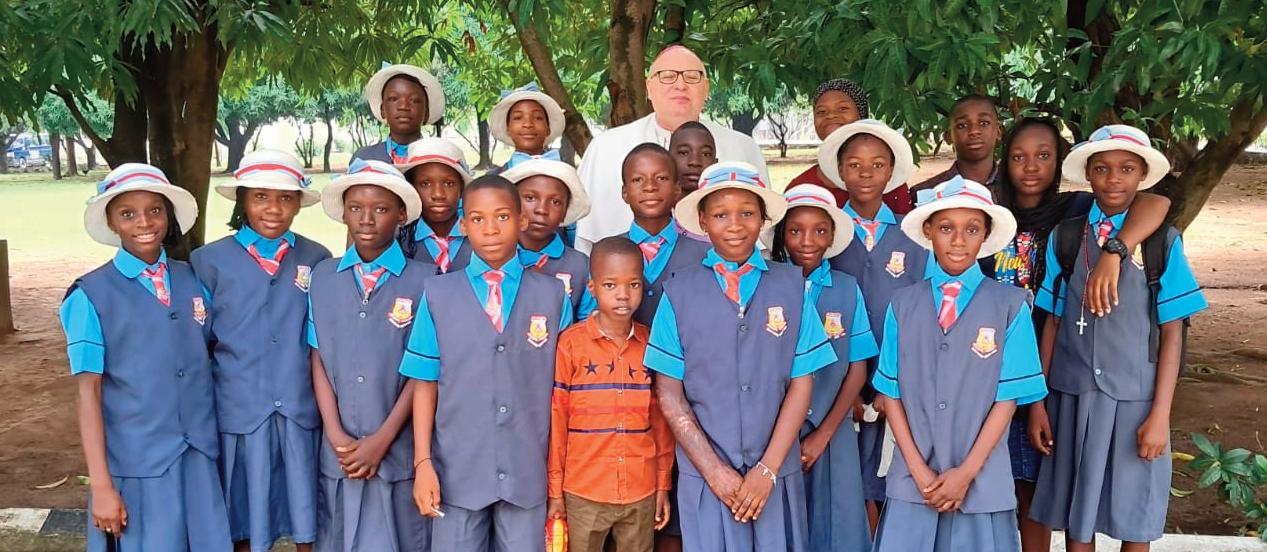
“God
bless all Nigerians, and all the
peoples
of Africa, and those descended from them, present here in our Archdiocese of Southwark”.
On his first trip to the continent of Africa, Archbishop John Wilson visited Nigeria’s capital city, Abuja, and Gwagwalada to ordain 10 new priests. Archbishop John spoke of a deep and powerful faith in the Lord Jesus within the people he met, where “no matter what”, the “name and person of our Saviour is the centre and focus of life”.
ordained priests will soon be sent out on mission across the world. In a Pastoral Message on his visit, Archbishop John said he had “never ordained so many priests at the same time before”, adding how moving it was to witness “the generosity and dedication of these ten young men” who will soon be sent out on mission, often to countries which had previously sent missionaries to Africa.
The MSP is celebrating its 40th year of priestly ordinations this year, with priests being
The Archbishop of Southwark was invited to ordain the priests by the Missionary Society of St Paul of Nigeria (known as MSP). The newly rcsouthwark.co.uk
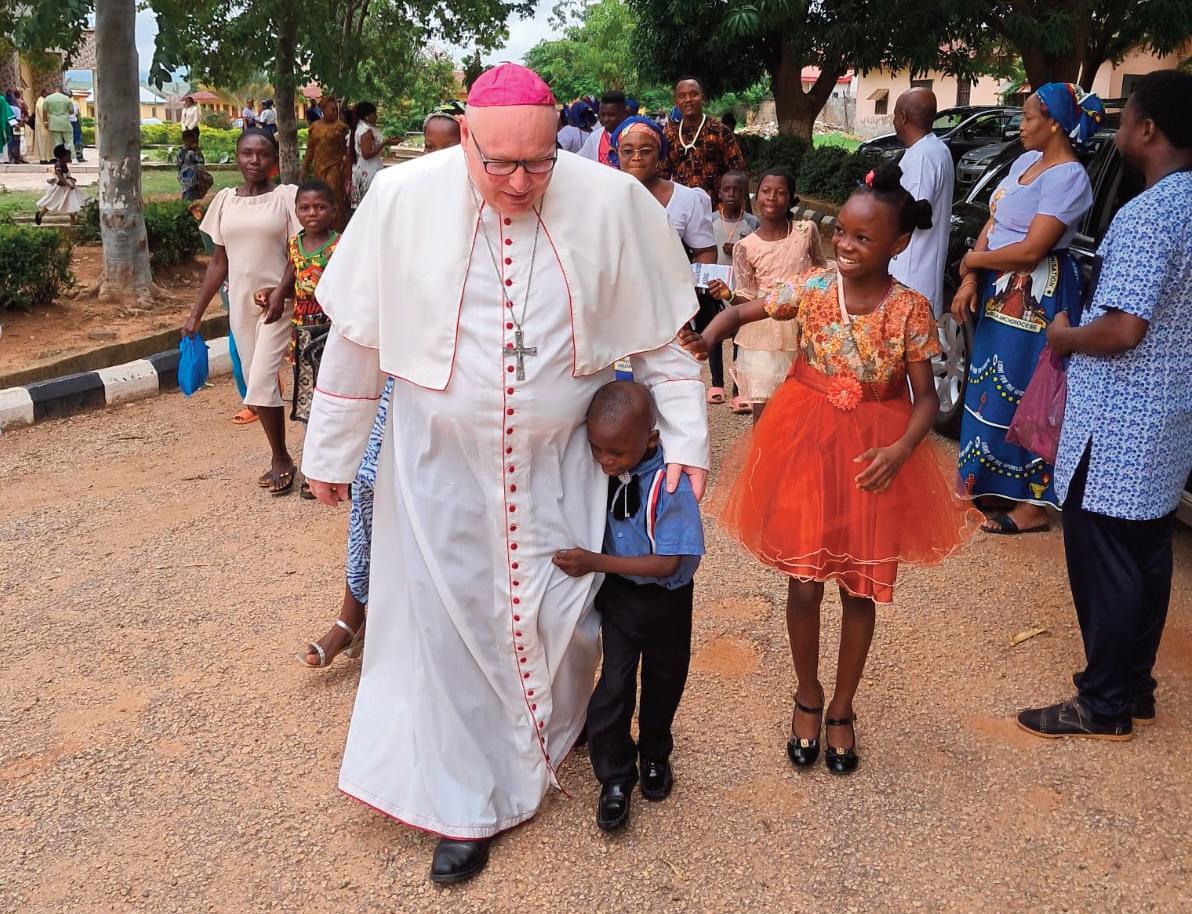
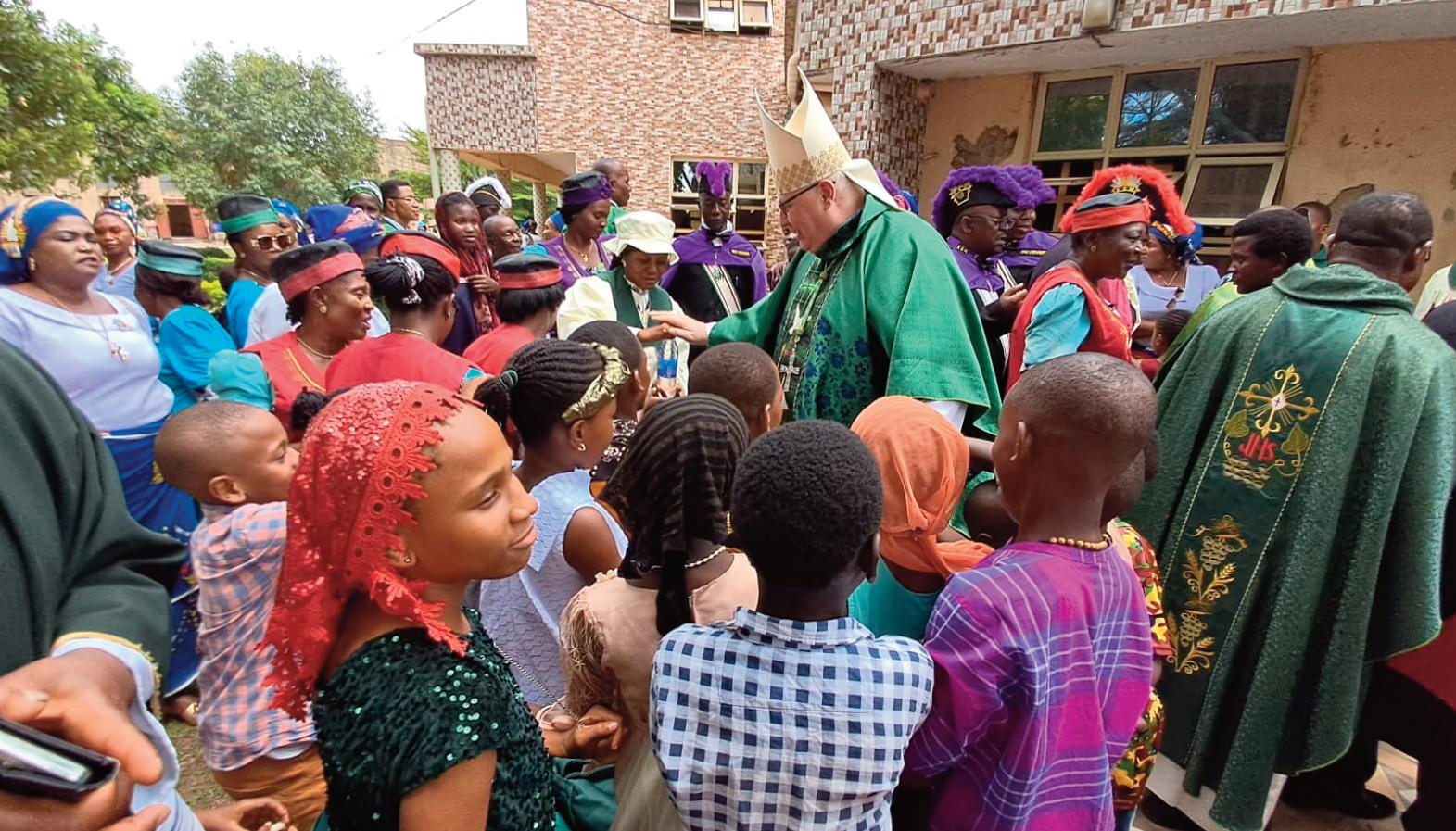
ordained every successive year since 1985. The MSP has a rich history of sending priests on mission to spread the Good News across Africa, Europe and North America.
The Archdiocese of Southwark has been blessed with priests from MSP, who continue to serve our Archdiocese. The Archdiocese is also fortunate to have laity, consecrated religious and other clergy from Nigeria who have made it their home.
Archbishop John said: “Catholics from across Africa and the entire world enrich our Church, bringing to life in our communities a beautiful and richly diverse mosaic of God’s creation”.
The Archbishop also thanked Nigerian Catholics for making the Archdiocese their home and expressed gratitude for the ways in which Nigerian Catholics make the joy and fidelity of their faith present in the Archdiocese.
Reflecting on his visit, the Archbishop of Southwark said he had never been to a place where the word “welcome” is used so often by
so many people. His visit, Archbishop John said, provided a “a powerful lesson in hospitality from which we can all learn – in our homes, families, parishes and schools. We are to be always, each of us, people of welcome”.
Archbishop John also spoke about the deep and powerful faith in Christ and love for His Church, the Mass and Eucharist he saw in Nigeria. Celebrating Sunday Mass in St Paul’s Catholic Church, Gwagwalada, was an “experience of the Acts of the Apostles alive today” the Archbishop said. The faith of the people shone through so brightly and their participation so strong, it provided a rich example of how we should all approach the Mass.
Concluding his Pastoral Message, building on the words of Pope John Paul II on his second visit to Nigeria in 1998, Archbishop John said:
“God bless all Nigerians, and all the peoples of Africa, and those descended from them, present here in our Archdiocese of Southwark”.





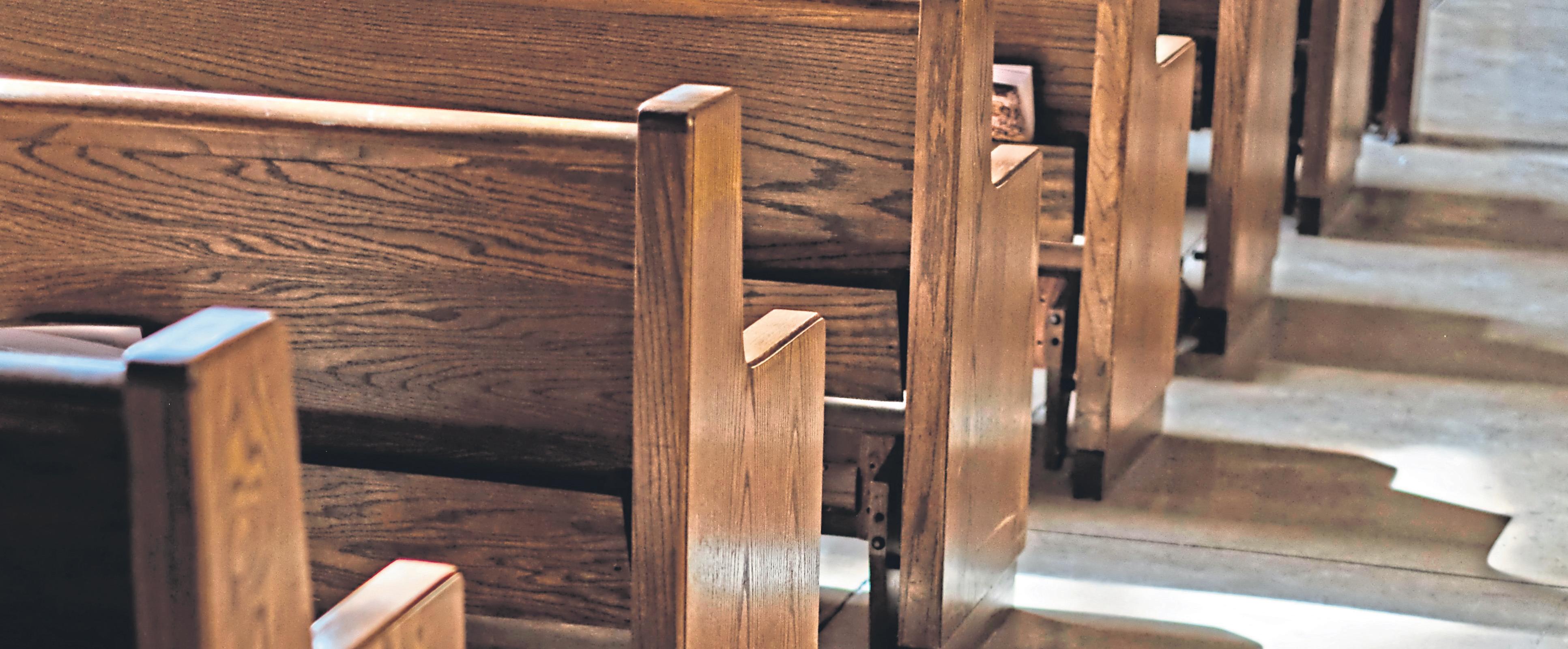

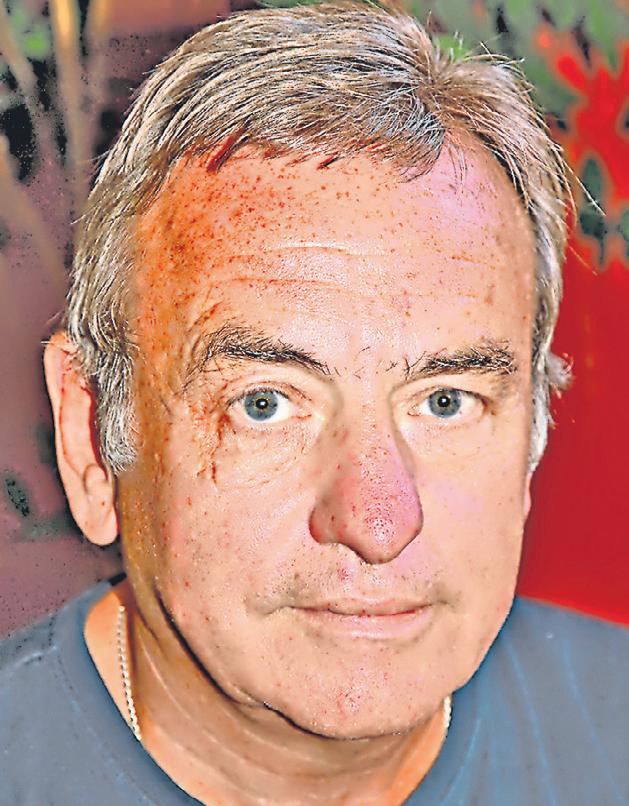
Dr Jay Kettle-Williams
According to traditional teachings, The Ten Commandments were written by the finger of God (Exodus 31:18) on the two stone Tablets of the Law
The Eleventh Commandment is a novel by Jeffrey Archer, first published in 1998, the title of which refers to the rule ‘Thou Shalt Not Get Caught’. Be that as it may, I wonder what might have been the eleventh commandment Moses would have brought down from Mount Sinai.
Mount Sinai (pictured) – variously referred to as Moses’ Mountain, Mount Moses, Mount/Gebel Horeb or Mount/Gebel Musaon the Sinai peninsula in Egypt is traditionally accepted as the site - according to the Torah, Bible and Quran - at which Moses received the Ten Commandments from God (Exodus 20:317). The mount, made of granite, stands 2285 metres (7497 ft.) above sea level with 4,000 steps constituting the Path of Moses, oft trodden these days by pilgrims and tourists.
According to traditional teachings, The Ten Commandments were written by the finger of God (Exodus 31:18) on the two stone Tablets of the Law. The biblical narrative continues with mention of the stones then being smashed by Moses, enraged at the sight of the Children of Israel worshipping a golden calf (Exodus 32:19). Moses then chiselled out a second set to be rewritten by God (Exodus 34:1).
The Talmud, the central text of Rabbinic Judaism and the primary source of Jewish law and theology, tells us that the stones were made of blue sapphire – or perhaps lapis lazuli - symbolising the sky, the heavens and the throne of God.
Popularly described and often depicted as round-topped rectangles, the tablets were most likely rough-hewn rectangles with sharp edges, as reflected in Christian art throughout the first millennium CE.

So I can’t help but wonder what might have been the eleventh commandment had one been forthcoming from the hand of God, to what eleventh commandment might have Jesus been aluding when he drew a line in the sand? Several suggestions cross my mind.
‘Do not judge …’ (‘Do not judge, and you will not be judged.’ Matthew 7:1) strikes me as particularly apposite these days when intolerance casts an ever-increasing shadow across social mores and society at large.
‘Live and let live’ is a wise proverb, not that others are not. To my mind, it prompts personal, individual responsibility yet breathes tolerance of one’s fellows.
Alternatively there is what has been pithily referred to as ‘The Golden Rule’: ‘Do unto others as you would them do unto you’ (Luke 6:31 and Matthew 7:12).
But for my first choice of a hypothetical eleventh commandment, I draw on instruction I once received from a highly acclaimed cleric and Bishop of the Catholic faith. He explained that there is one commandment, one instruction, one exhortation which serves as the keystone holding all others in place, that being the words attributed to St Augustine in a sermon on 1 John 4:4-12: ‘Love God and do thy will’.
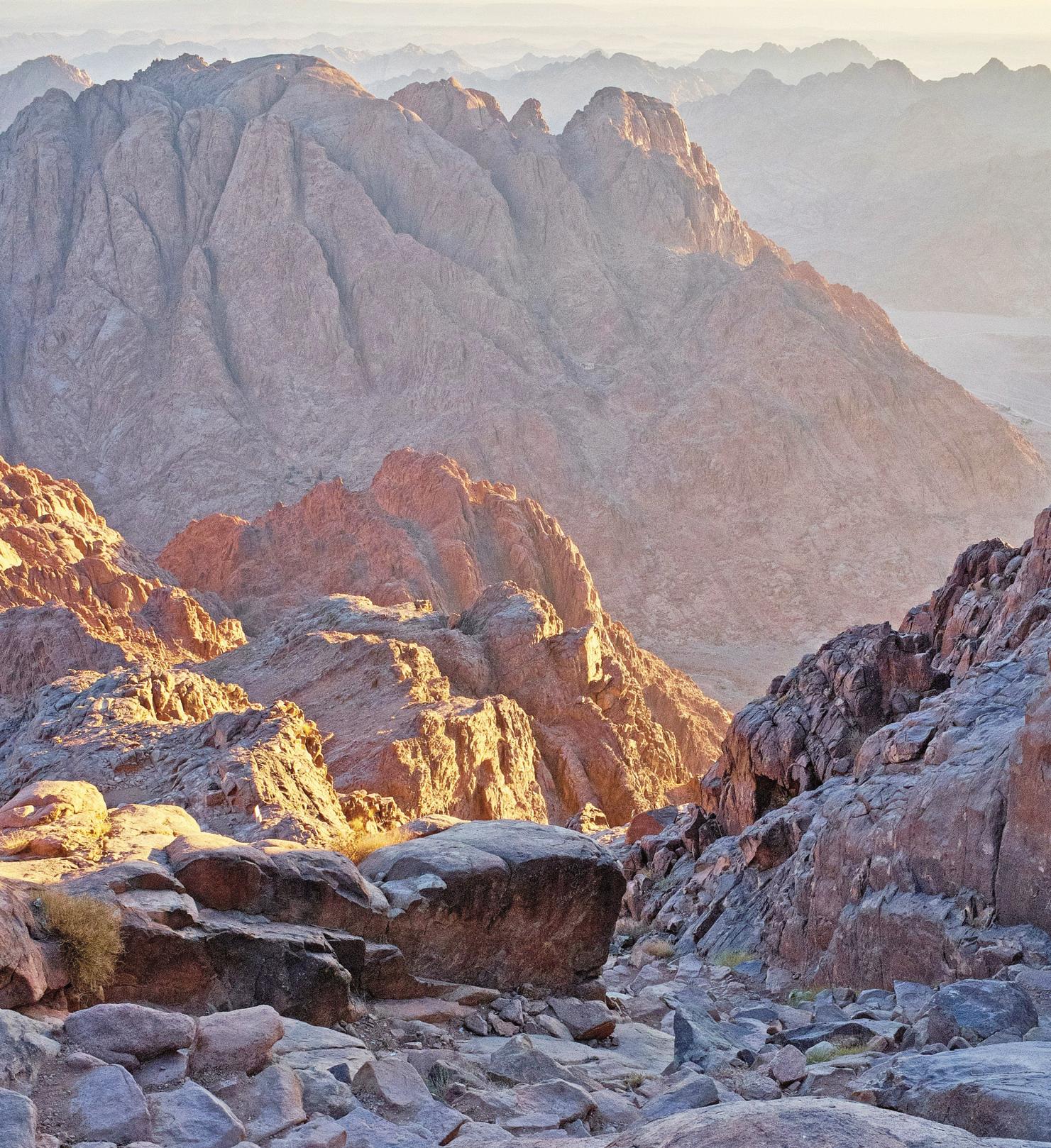
Acknowledgements and Attribution: Texts/References adapted and/or adopted from http://en.wikipedia.org under the terms of the Creative Commons Attribution-ShareAlike License 4.0: http://creativecommons.org/licenses/bysa/4.0/; Photographs © on Unsplash: Mount Sinai (Aerial view) by Vlad Kiselov; Mount Sinai (Ground view) by Artem Labunsky.

Dr J L Kettle-Williams is an experienced business communications consultant and wordsmith (tutor, writer, translator).
birminghamdiocese.org.uk
“You brought me here, so what do You want me to do?”
A new podcast for Catholic audiences has launched this week. The All Kinds of Catholic podcast has been created by Theresa Alessandro who hosts the weekly episodes. A new conversation with a different Catholic guest will be released on Wednesdays. The dialogue focusses on how each person is living their faith in the world today – with all the hopes, joys and disappointments that any of us might experience.
Fresh from working at two different Catholic organisations and with her own lifelong experience of being a Catholic, Theresa felt called to develop this project in which she is joined by Catholic people who are often not in the public eye. She reports, ‘I have talked to so many ‘ordinary’ Catholic people in my work and in my life, whose journeys in faith have resonated and given me such encouragement and affirmation – and sometimes challenge. It has been hard work learning how to produce and distribute a podcast but it is a privilege to host the conversation with my guests. Each one is somehow beautiful, far from ‘ordinary’, and certainly spiritually nourishing.’
The All Kinds of Catholic podcast is especially timely during the current synodal process

when we are asked to listen deeply to one another. In the first episode, Peter shares how his faith has been shaped by growing up in a Catholic family, serving the church from a young age, starting a new chapter in another country, and using his skills and experience to build community and to advocate for climate change: ‘You brought me here, so what do You want me to do?’ In the second episode, Maggie shares how she and her sister used to ‘race Jesus up the stairs’ to the third-floor flat they grew up in.
On the Saturday morning after the recent General Election I met 6 or 7 shoppers in a local supermarket. In some various discussions no one mentioned the then very recent poll. Perhaps this was no great surprise as we now know that 4 in every 10 people on the electoral roll did not vote on July 4th.
Back in 2016 the referendum on our membership of the European Union produced a much higher number of voters and yet the Brexit poll and its consequences or lack of them rarely featured in the recent party campaigns.
One post election comment summed up the electoral disillusionment by speaking of political infighting while ordinary people struggled to put food on their tables.
Despite all the negative observations the new Prime Minister was right to say that politics can be a force for good. We have 334 new members of Parliament they should be aware that the people who voted and those who did not will expect honesty, integrity and wisdom. I think we all know there is no magic money tree but we should be informed better of how tax payers money is allocated and why funding is being postponed or even rejected. That is surely not just being honest but saying truth really matters.
Integrity and wisdom not only are part of our Christian Faith but should be involved in changing society for the better. All too often the weakest are the most vulnerable. In the last Parliament we heard much about support
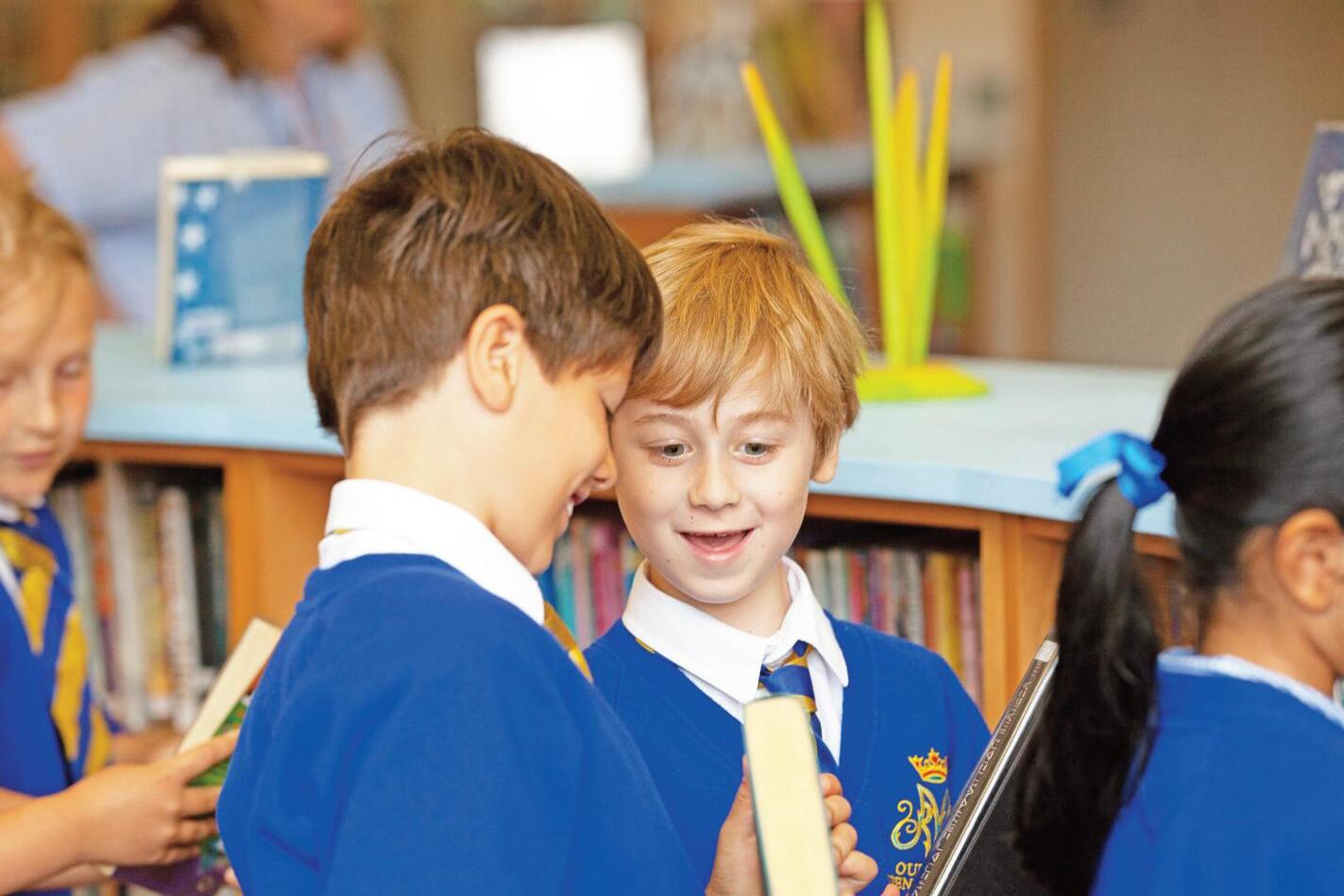



Taken together, these stories illustrate the image Pope Francis uses in Evangelii Gaudium, of a ‘chaotic…genuine experience of fraternity, a caravan of solidarity, a sacred pilgrimage’ experienced by Catholic people ‘stepping into this floodtide’ of life.
Tune in, wherever you get your podcasts, and listen to Catholic people sharing their faith journey with you.
To listen to the podcast go to www.kindsofcatholic.buzzsprout.com


for assisted dying but virtually no concern for the plight of some of our hospices. Seventy percent of the financial support of these most vital supporters of human life comes from the fund raising. One in the north of England recently needed a large loan just to keep going. Who will champion their cause in the new Parliament?
There are so many other areas of concern that will come up against funding not being available and the two-child benefit cap seems to fall short when we hear about “tackling child poverty”. These children are the future of our country, they and we will be about to find out who we really are, and if politics can be a force for good.



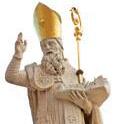




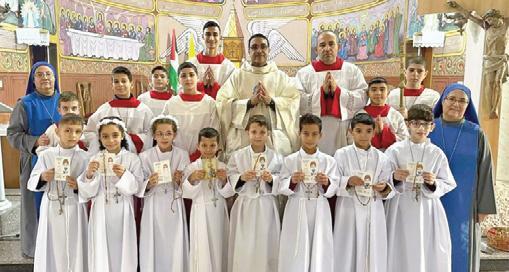




















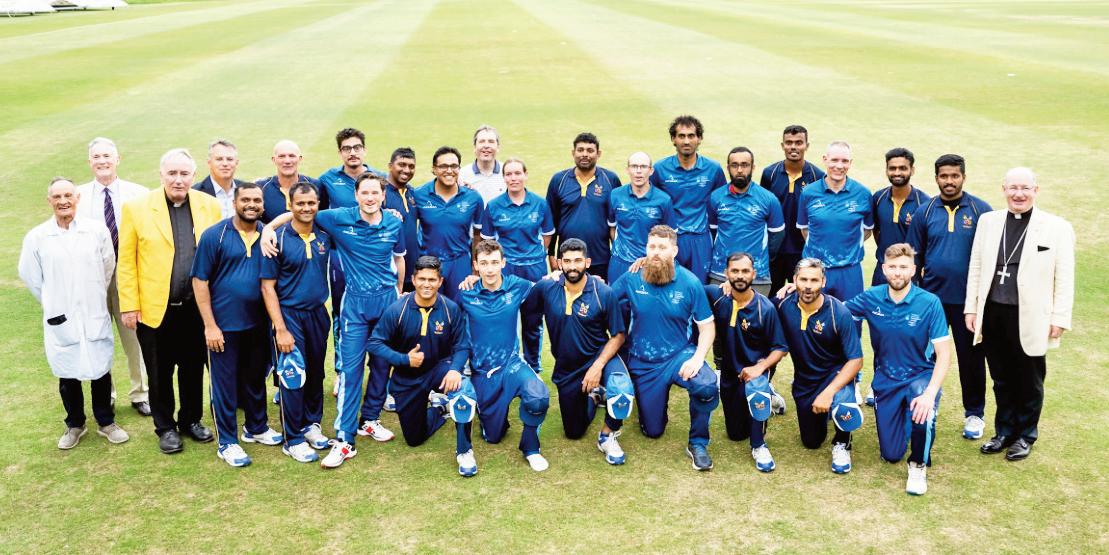

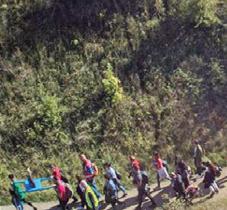
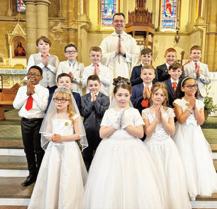







“Philip Booth attends Mass at my parish and secured me months ago – it’s like all these things, you say ‘yes’ and then, as the day approaches, you realise how little you perhaps know about the laws of cricket!
Arundel Castle Cricket Club played host to a markedly close game of cricket on Monday as part of the Vatican’s tenth "Light of Faith" tour (28 June to 5 July). The Duke of Norfolk welcomed both the Vatican and St Mary’s University, Twickenham, teams to the grounds of Arundel Castle, with the match closely followed by Bishop Richard, Chair of St Mary’s Board of Governors, and umpired by Professor Philip Booth, Director of Catholic Mission at St Mary’s, and Fr Raglan Hay-Will, Parish Priest of Haywards Heath & Burgess Hill and future Moderator of Lewes and Mayfield.
Reflecting on his role as umpire, Fr Rags said: “Philip Booth attends Mass at my parish and secured me months ago – it’s like all these things, you say ‘yes’ and then, as the day approaches, you realise how little you perhaps know about the laws of cricket!
“The absolute highlight for me is simply being here. I played in the second 11 at school but also, more importantly, for Burpham & Warningcamp Cricket Club based two miles or so from here across the valley; playing there was lovely, and we had about 40 fixtures a year. That said, this has got to be the most
beautiful ground in the country without
exception.”
The “Light of Faith” initiative, as reported in the L’Osservatore Romano and Vatican News, has previously visited the UK, Portugal, Italy, Argentina, Kenya, Malta and Spain. It aims to "spread the message of friendship, unity and gospel hope" with the Vatican Team, who are all seminarians and priests based in Rome, acting as ambassadors for the Catholic priesthood by "bearing witness to the Christian faith among sports women and men".
The Vatican team opened the batting, achieving 136 for 5, with St Mary’s ending the match just four runs short of victory with a total of 133 for 5. Speaking shortly after the event, Bishop Richard said:
“The Vatican team was formed to bear witness to the Christian faith among sports women and men and promote dialogue and friendship between the Catholic Church and parts of the world where cricket is popular. Enthusiasm for the game and the wider endeavour was certainly much in evidence during Monday’s closely fought match, with an enjoyable and enriching afternoon experienced by all.”
The visit also enabled the children to find out more about the democratic process, which they had been studying during the recent local elections.
Caring children from North Shields had the opportunity to question the MP Sir Alan Campbell during a visit to their school, one of his last appointments before the General Election. The children from Year 6 at St Cuthbert’s Catholic Primary School quizzed him about mental health support provision for young people.
The meeting was arranged by the pupils who had been campaigning for Fund the Hubs – an initiative to improve support for children and young people with mental health issues.
Sir Alan visited classes across the school, a member of the Bishop Bewick Catholic Education Trust, which holds a UNICEF Rights Respecting Gold Award for its child-rights approach.
“The children invited him because they are passionate about all children and young people deserving good quality support when needed, as part of the Fund the Hubs campaign,” said Headteacher Shaun Dillon. “Fund the Hubs is led by the Young Minds
charity, and over 5,000 young people have signed a letter which has been sent to Downing Street calling for early support hubs for young people.
“Sir Alan met with all the children and staff at the school and took part in a question and answer session with Key Stage 2 where he responded to their concerns about support for children’s mental health.”
The visit also enabled the children to find out more about the democratic process, which they had been studying during the recent local elections.
“Our whole school had been using the book The Election to learn about the democratic process and link it to the local elections,” continued Mr Dillon.
“Our children understand that different people support different political parties and that political parties need to campaign in order to win votes, and Sir Alan explained the process in lots more detail. He talked to them about the

democratic process, elections, the role of MPs and Government, serving your community, and children’s rights based on the UNICEF Rights Respecting Schools Award.
“He was also delighted that St Cuthbert’s has three Mental Health Leads and that children, families and staff do so much work around mental health and wellbeing, and that it is at the heart of everything St Cuthbert’s does.”
Other causes successfully supported by St Cuthbert’s include the introduction of a safe road crossing outside the school, provision of bins for dog walkers in the area, and the restoration of a nearby play park.
“Visits like this confirm to our children that they have rights and they have a voice which adults listen to and respond to.” added Mr Dillon.
“Data shows that building fences and pushing back people won't stop them from seeking safety and protection”.
Access to the Polish-Belarusian border has been restricted, preventing the provision of humanitarian assistance to refugees seeking international protection. The Norwegian Refugee Council (NRC) urgently calls on the Polish government, the European Union, and the international community to address the escalating humanitarian crisis.
"The exclusion zone with no access for humanitarian workers is a recipe for disaster. It affects the weakest and the most vulnerable refugees seeking international protection. Data shows that building fences and pushing back people won't stop them from seeking safety and protection," said Neil Brighton, NRC's country director in Poland.
"The European Union and the international community must support the Government of Poland by increasing reception capacity at
the border and addressing the root causes of displacement through humanitarian and development assistance."
Since the crisis began in 2021, NRC and local partners have recorded nearly 20,000 requests for assistance and nearly 9,000 violent pushbacks, including incidents involving pregnant women and minors. 82 deaths related to the conditions at the border have been documented in the 'death zone' between the Polish and Belarusian border fences and along the border. This area is characterised by extreme temperatures and dense forests and swamps, making it a dangerous crossing for refugees seeking protection. Those crossing the border irregularly, have endured hardships and long journeys from Iraq, Afghanistan, and other countries as far as Eritrea.
"They hit you with sticks to make your body grow bigger and swell up so that no one will manage to pass through," said Amina from Syria, a refugee who experienced nine pushbacks. On the final time, she managed to reach Polish territory, where she sought help from one of the humanitarian organisations operating in the area.
Farid, a refugee from Afghanistan, recalled: "They asked me 'Where are you from?' I said I was from Afghanistan. They hit me on my broken leg, and I shouted terribly, which made them very angry - they beat me."
NRC has been supporting and working closely with local organisations, on the Polish territory, to provide thousands of refugees with lifesaving assistance and legal aid. Despite these efforts, the recent reintroduction of the exclusion zone, a legally defined area restricting access for unauthorised individuals along parts of the Polish-Belarusian border, has severely restricted access for humanitarian workers to support those trapped at the border.
"We believe that nobody should be left in lifethreatening conditions regardless of their origin, nationality or religion. We strongly believe that a safe border means a border that is safe for all people, where the rights of those seeking international protection are respected," said Katarzyna Potoniec from Egala Association, one of NRC's local partner organisations in Poland.
NRC calls on the Polish government to ensure humanitarian access to those in need, and to

adhere to the Geneva Convention and the European Convention on Human Rights and ensure all claims for the international protection are properly processed. The European Union and international donors must provide sustained funding and support to address the urgent needs at the border and establish safe, legal pathways for refugees.
Nearly 20,000 requests for assistance, 82 deaths and nearly 9,000 violent pushbacks of refugees have been recorded by NRC's local partner We Are Monitoring since 2021.
Diocese of Middlesbrough/ICN
“He lived simply, humbly. The description of his hut on the moors would make anyone feel the cold, even on a day like this. He knew that one day the intolerance of the age would seek him out - and it did.”
Hundreds of Catholics have gathered outdoors to honour Blessed Nicholas Postgate.
Cardinal Arthur Roche urged them never to give up praying until the Martyr of the Moors is declared a saint.
Despite intermittent rain, more than 700 people gathered for the 50th annual Postgate Rally, which took place in a field at Ugthorpe in north Yorkshire. Coaches came from Hull, York, Middlesbrough and Redcar with many more travelling by car.
Blessed Nicholas ministered on the North York Moors for nearly half a century before he was hung, drawn and quartered on the Knavesmire, York, in 1679, when he was 82.
One of the last Catholics to be put to death for their faith, he was beatified by Pope St John Paul II in 1987.
Cardinal Roche, who is prefect of the Dicastery for Divine Worship and the Discipline of the Sacraments, said Blessed Nicholas gave an example for all Catholics to follow. He said: "He lived simply, humbly. The description of his hut on the moors would make anyone feel the cold, even on a day like this. He knew that one day the intolerance of the age would seek him out - and it did.
“Nicholas did not condemn any of them. Indeed, he died praying for them. A feature of his last days was that he greeted everyone with the open arms of charity and joked they had done him a great favour by giving him such a 'short cut' to heaven.
"Blessed Nicholas and our English and Welsh martyrs give us the courage not to lose our
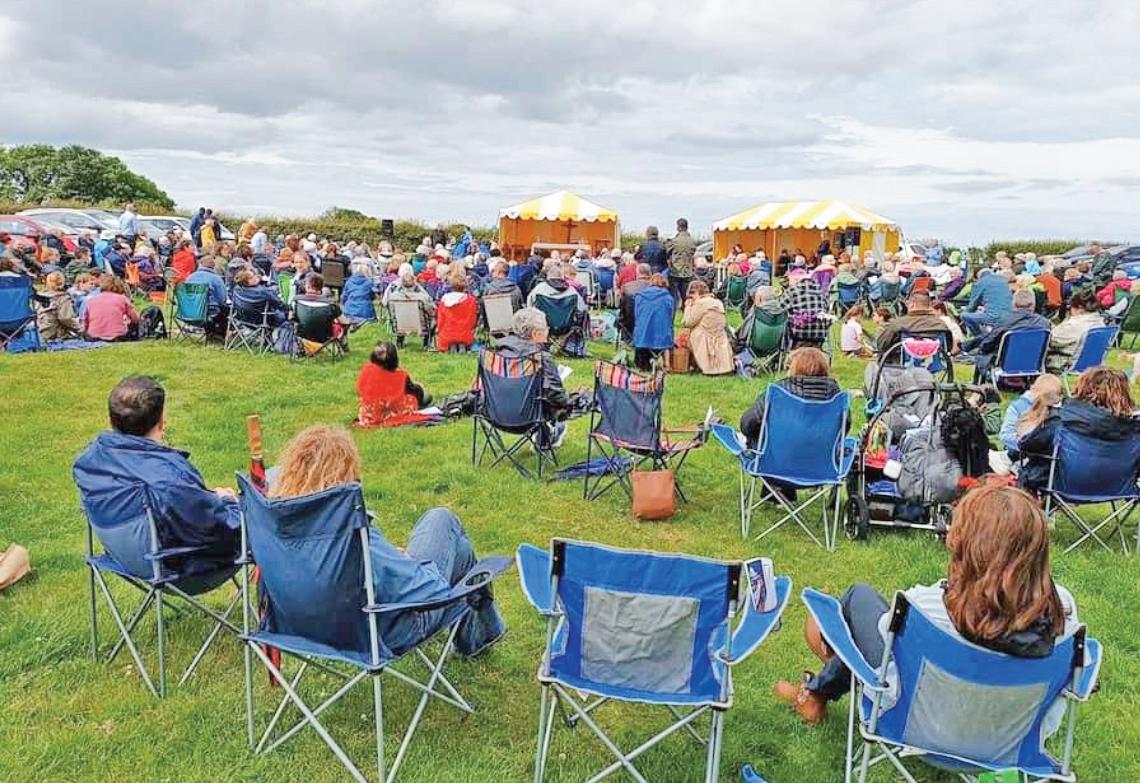
footing by taking the high road of indifference and superiority, but instead the track of life trodden by Christ that keeps us sane and close to reality.
"Blessed Nicholas, the great-grandfather of those of you in these parts who share the faith he lived and died for, whose legacy then is still with you today, remains with you. His
For the recent Feast of Pentecost, Holy Family Parish in Nottingham decided to do a mapping exercise to discover how many nationalities make up the parish. People were invited to let the parish office know their country of birth, so that they could all be marked on a World Map on display in each of the three churches in the parish. After a few weeks, the parish is now up to 42 different nationalities, and counting! Every continent, except Antarctica, is represented, with people coming from as near as Ireland, to as far away as Chile, Australia, Canada, and China. The maps are a wonderful image of the diversity of the parish, the universality of the Catholic Church and also show what a blessing immigration is to our Church and country. After Mass, there is always a small crowd of children at the map, showing their pals where their parents or they were born and trying to work out who has travelled the furthest to get to Nottingham.
‘Ah Dad, who is ov’r in ‘eaven’
To tie into the Year of Prayer and the focus during 2024 on the Lord’s Prayer, the parish has also asked parishioners to write out the Our Father in their own language. So, displayed in each Church is the Lord’s
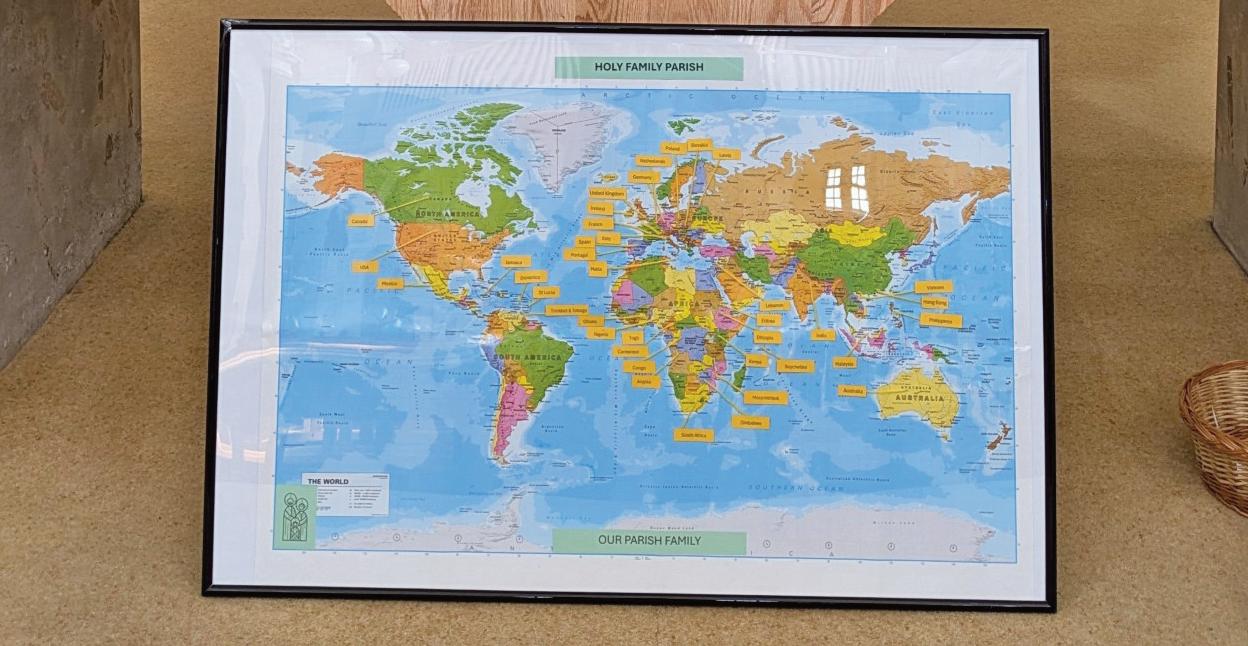
Prayer in Chinese, Lebanese, Portuguese, French, Kikuyu, Maltese, Kiswahili, Igbo, Dutch, Vietnamese, Hausa, Idoma and in Nottingham dialect (which starts ‘Ah Dad, who is ov’r in ‘eaven. Ittsimm whose holy’)
On the Feast of Pentecost, at each Mass on Sunday, people were encouraged to pray the Our Father in their own language, resulting in a wonderful, colourful babble of prayer. Parishioners prayed the Our Father with great pride and enthusiasm, happy to share their own way of praying with those around them. Afterwards, people chatted to people they had always sat near, but never really talked to, asking what language it was they had heard and asking where their fellow parishioners came from. The parish continues to add to the
World Map as more people come forward with their birth nationalities, reminding us of the importance of being a welcoming Church to those who seek to make their home here and to embrace them as part of the community. Holy Family Parish is truly blessed with people who come with a real sense of vocation and calling to minister in the parish as Readers, Catechists, Welcomers, Eucharistic Ministers …. often finding that the Church is the one place where they are welcome and valued. They find a home from home and enrich the life of the parish.
So here’s the challenge …… is there any parish that can identify more nationalities? 42 and counting……
faithfulness our model; his tenderness of soul our guide.
“Let us call upon his intercession in times of real need so that one day his memory may be celebrated at the altars in this land - someone not dismissed or forgotten but cherished by you as your very own saint! Keep his memory alive throughout the diocese.
“Keep asking God, through his intercession for the gift of that miraculous sign and do not rest until you get it!"
Cardinal Roche travelled from Rome especially for the rally, staying with his friend, Bishop of Middlesbrough Terry Drainey, who was the principal celebrant at the Mass. Twenty-seven priests concelebrated Mass, including the Abbot of Ampleforth, Dom Robert Igo.
Postgate Society chair Monica Ventress said: “Our 50th anniversary Postgate Rally went very well, despite the poor weather.
“It was good to see so many of our priests and people from across the diocese who all came to share this special day.
"Our special guest, Cardinal Roche, had flown from Rome especially for the occasion.
“His homily reminded us that many of the virtues practised by Blessed Nicholas Postgate are still very relevant today. May we soon see the day when Blessed Nicholas is canonised."
The Postgate Rally takes place in Ugthorpe and Egton Bridge, two villages closely linked to the life of Blessed Nicholas, on alternate years. Numbers have been rising in recent years, with last year's 500 in attendance doubling the 2022 figure. The Postgate Society exists to spread knowledge of Blessed Nicholas and to promote interest in Catholic history during penal times.
Find out more at: www.postgatesociety.org.uk. Michael McGeary
Matthew J.C. Ward
£14.95
CTS Product Code: MU02
Please refer to this code when ordering over the phone
ISBN: 9781784697976
Available for pre-ordering
This item will be released 14th October 2024. www.ctsbooks.org
This volume of newly composed Gregorianstyle Mass psalmody, using the same Abbey Psalter translation as the new Lectionary, closely ties the music of the psalms to the liturgical cycle. Voice edition.
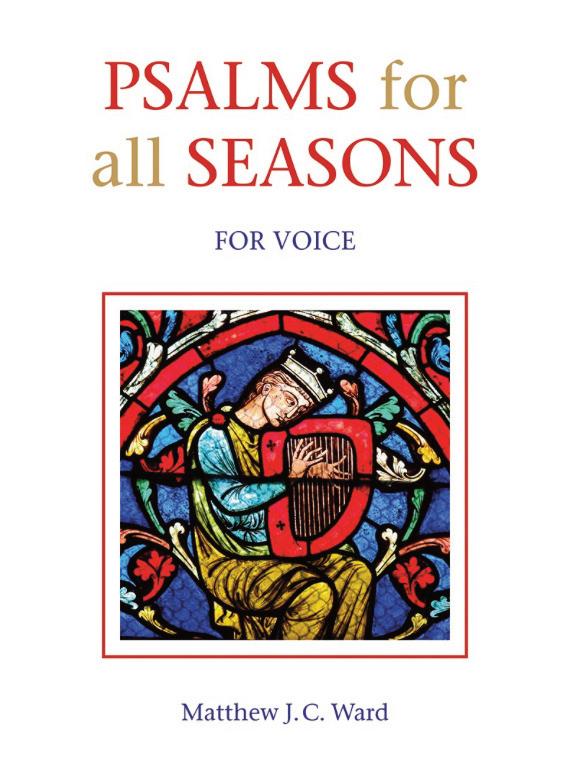

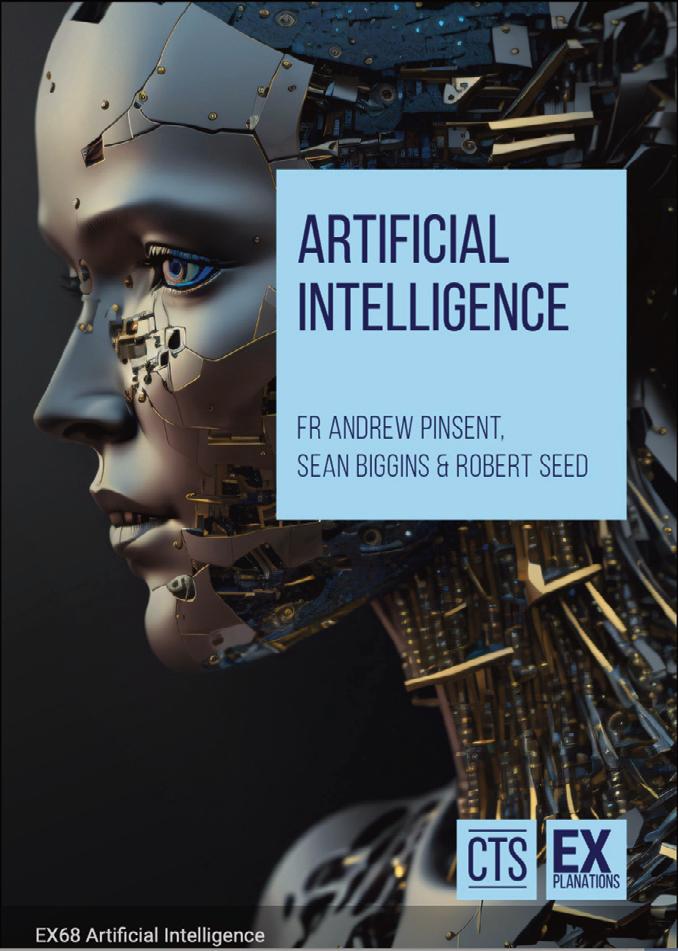
We all use Artificial Intelligence, or AI, online. It determines our search engine results, curates our social media feed, and guides how we click through websites. Recent refinements in AI mean that it can compose text and produce images faster, and sometimes better, than humans. Chatbots are used for customer service and online diagnostic tools, and as social surrogates. The better AI mimics human activity, the more questions it raises: Is AI smarter than humans? Could it ever become human? Could it replace us? What do the advances in Artificial Intelligence mean for society, the Church, and the world?
• Inspiring introductions for major feasts and seasons
This gilt-edged, burgundy bonded leather missal with two ribbons and a slipcase makes an inspiring gift for any Confirmation candidate, recent convert or life-long Catholic.
Dicastery for the Doctrine of the Faith
£4.95
CTS Product Code: DO974
Please refer to this code when ordering over the phone
ISBN: 9781784698171 www.ctsbooks.org
Drawing on scholarly research, Caroline Fletcher revisits the stories of characters such as Priscilla, Barnabas and Onesimus, among others. Setting them in their historical and cultural context, she brings them vividly to life, and opens a window on the New Testament.
“An insightful and user-friendly study guide written with warmth and thoughtfulness. A useful tool for individuals and study groups which should prompt conversation and debate.” The Revd Canon Kate Bottley
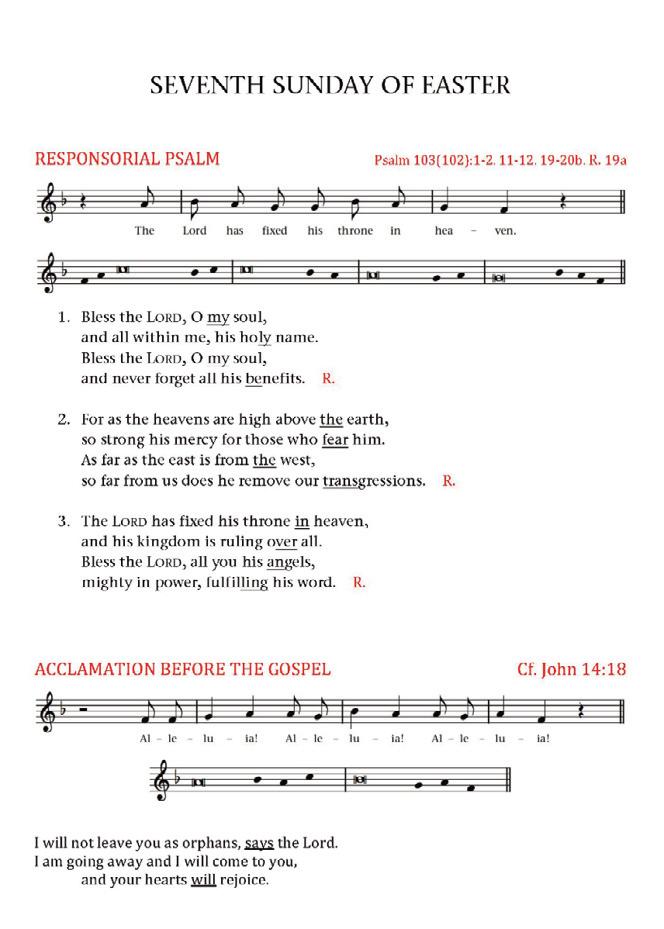
This volume of Mass psalmody for the whole Church year takes a novel approach rooted in the Church's liturgical seasons and ancient musical tradition. In order to tie the music of the psalms more closely to the liturgical cycle, each season – Advent, Christmas, Lent, Easter and Ordinary Time – has distinct and contrasting melodies. This not only helps musicians and congregations to learn the melodies quickly and easily, but also functions in the same way as liturgical colours to lend a particular character to each season. Psalms for All Seasons offers a new way to 'sing the Mass' that complements other aspects of the liturgy and contributes to the beauty and unity of the celebration.
Fr Andrew Pinsent, Robert Seed, Sean Biggens
£3.95
CTS Product Code: EX68
Please refer to this code when ordering over the phone ISBN: 9781784697631 www.ctsbooks.org
What do the advances in Artificial Intelligence mean for the Church and the world?
Fr Andrew Pinsent recounts the history of “intelligent machines”, evaluates the impact of AI at present, and offers informed speculation about the future relationship between humans and AI.
In this book, Fr Andrew Pinsent answers these questions and many more as he recounts the history of “intelligent machines”, evaluates the nature and impact of the present capabilities of AI, and offers some informed speculation about the future relationship between humans and artificial intelligence.
Bishops' Conference of England and Wales
£9.95
CTS Product Code: DO968
Please refer to this code when ordering over the phone ISBN: 9781784697693 www.ctsbooks.org
This attractive volume is a treasury of prayers and supplications from Holy Scripture and Sacred Tradition that can be used by the faithful in spiritual warfare against the powers of darkness, in any time of fear, distress or temptation.

CTS Missals beautifully present the new texts of the Lectionary along with Mass texts in sideby-side Latin and English and short introductions to the main feasts by recent Popes.
All hardback and leather-bound missals have a durable, attractive binding, a clear layout, and include:
• Order of Mass with all Eucharistic prayers, prefaces, concluding rites and blessings
• Prayers and devotions
• Masses for special occasions and needs
• Comprehensive appendix of prayers and devotions for all occasions

The Dicastery for the Doctrine of the Faith reiterates and strengthens the Church’s perennial teaching on the universal and infinite dignity of every human person, emphasising its origin in God, the loving creator who formed us in His own image.
In this declaration, the Dicastery for the Doctrine of the Faith reiterates and strengthens the Church’s perennial teaching on the universal and infinite dignity of every human person, emphasising its origin in God, the loving creator who formed us in His own image. In light of this, the DDF condemns the grave violations of human dignity that arise in today’s world from a number of contemporary evils including: violence against women, abortion, surrogacy, euthanasia, gender theory, sex change operations, and digital violence.
By Caroline Fletcher
£10.95
Product Code: 1980
ISBN NO: 9780852316412 www.rpbooks.co.uk
By Emily Jaminet
£12.95
Product Code: 11760
ISBN NO:9781646802180 www.rpbooks.co.uk
Jesus invites you to experience his love through devotion to his Sacred Heart, a powerful source of spiritual and personal healing that can also transform your relationships with family, friends, and others around you.

In Holy Habits from the Sacred Heart, Emily Jaminet—executive director of the Sacred Heart Enthronement Network—identifies ten habits and virtues that come from the Sacred Heart. She also shows how you can intentionally practice these virtues in order to get closer to Jesus and strengthen the relationships that are most important to you.

Many centuries have come and gone since the books of the New Testament were written and the world they portray can be hard to relate to. Yet within its pages are the fascinating stories of real-life characters who, though mentioned only briefly, were impacted by the life of Jesus, some through knowing and spending time with him, and others through the witness of Peter and Paul and the other apostles.
Having Jesus at the center of family life isn’t reserved for the pious; it’s a form of practical spirituality that is open to everyone. Devotion to the Sacred Heart of Jesus has been a cornerstone of Jaminet’s life bolstering the faith of four generations of her family members. In this book she shares her own story as well as the reallife experiences of regular Catholics whose families have been changed for the better by the love and virtue that came from devotion to the Sacred Heart.

Football is a great way for children to find some release from the traumas they’ve experienced, meet new friends and learn how to overcome challenges in a fun environment.
Giving children and young people a release from the trauma of conflict
Despite the conflict, the Caritas Cup tournament continues to bring children and young people together each year to play football in Ukraine. Volunteers from Caritas Ukraine encourage vulnerable children to play no matter their ability or background.
Football is a great way for children to find some release from the traumas they’ve experienced, meet new friends and learn how to overcome challenges in a fun environment.
“We go to Caritas and we learn a lot of new things there. We want to win this cup. But I also want to become friends with children from other teams from other regions of
Ukraine. I hope we find a common language to be able to play football together in the future. ”
Angelina, Caritas Cup participant
The Caritas Cup is just one of the amazing initiatives Caritas Ukraine runs in Ukraine.
Since 2014, they have been responding to the conflict by supporting vulnerable people with essential resources, from warm shelter for displaced families to psychological support in a safe space.
The Caritas Cup keeps the ball rolling for children affected by conflict. That’s why, for us, Caritas Ukraine are the champions of the Euros this summer!
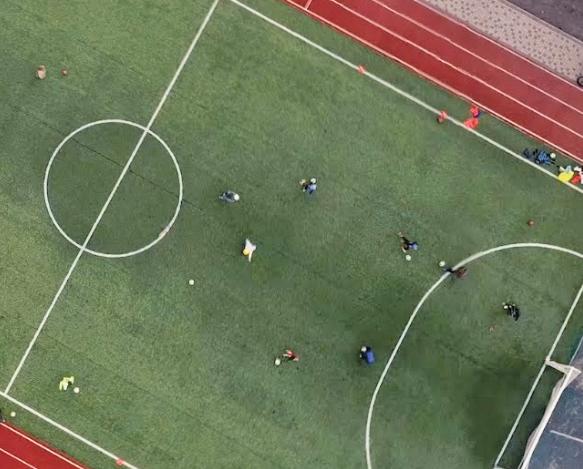
What can I do to help? CAFOD continues to support those affected by the conflict in Ukraine. Please visit cafod.org.uk to find out how to donate.




You can use both sets of clues to solve the puzzle: the solutions are the same.
CRYPTIC Across
7 Pool, outside Jerusalem, is a store of grain by morning (6)
8 Quiet after drink by the river in the Syrian city (6)
9 Felix's wife needs a doctor, getting sick in America (8)
10 Police officer close to Egypt reportedly finds a Christian sect member (4)
11 Pulls apart sick pun? (7)
14 Biblical prophetess's name for a Scottish town (5)
15 Midlands city cricket captain loses toss in the end (5)
17 One's reflective after transposing Yeats into the church (4-3)
21 Short recording following the appearance of old poet (4)
22 In Persia he, curiously, becomes a Jew (8)
24 Dangerous plant genus, dock, making a comeback in the borders of Asia (6)
25 Partly responsible, ambushing Canaan town (6)
CRYPTIC Down
1 Stories he tells sending up type of transport (4)
2 Road on which social climber turned up displaying ornamental shrub (6)
3 A boy king, son of Eliiphaz (6)
4 Native American's upset losing ring, one coming from Indonesia (5)
5 Clergyman's study down under is being curtailed (6)
6 Record at a pub, one New York's supporting, being a January fixture (8)
12 'Birth of a Nation's only half on – at six on telly, either side –at Christmas (8)
13 Top South Australian carnivore's kind of pouch (3)
16 Report Viking retreat in a valley near Jerusalem (6)
18 One killed in Susa is a boy found upset within Ionia's bounds (6)
19 Guard hurled the first of lances to be commandeered... (6)
20 ...Lance earl used to break up joust (5)
23 Biblical country's macho overthrow (4)
QUICK Across
7 Underground pool; once a major water source for Jerusalem (6)
8 Second city of Syria (6)
9 Wife of procurator Felix who heard Paul's case (8)
10 Member of a Christian sect; one descended from the ancient Egyptians (4)
11 Pulls apart; works out (7)
14 UN Secretary General 1997-2006; Scottish town (5)
15 Add fuel to: keep (a fire) going (5)
17 Middle-of-the-road illumination (4-3)
21 Roman poet remembered for his elegiac verses on love (43 BC - AD 17) (4)
22 Member of a strict sect of Judaism (8)
24 Genus of the family commonly known as belladonna or deadly nightshade (6)
25 Town of Canaan where Jehu killed Ahaziah (6)
QUICK Down
1 Fabricator of the truth; perjurer (4)
2 Japanese dwarf trees and shrubs (6)
3 Grandson of Esau and son of Eliphaz (6)
4 Son of Japheth, father of people who lived in Greece and Asia Minor (5)
5 Position of an ordinand on successful completion of training (6)
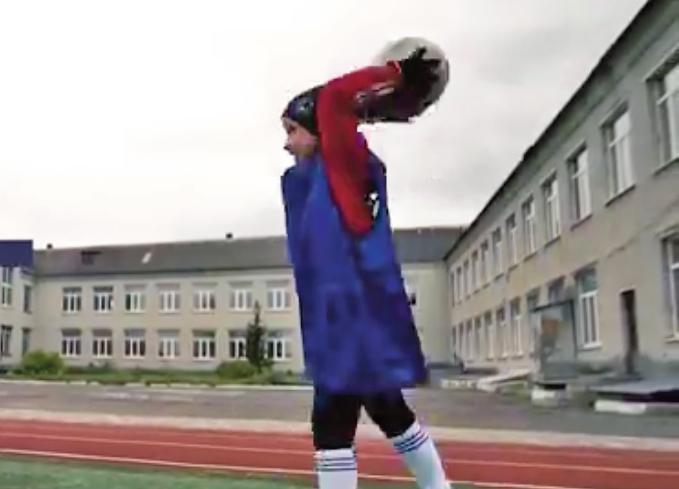
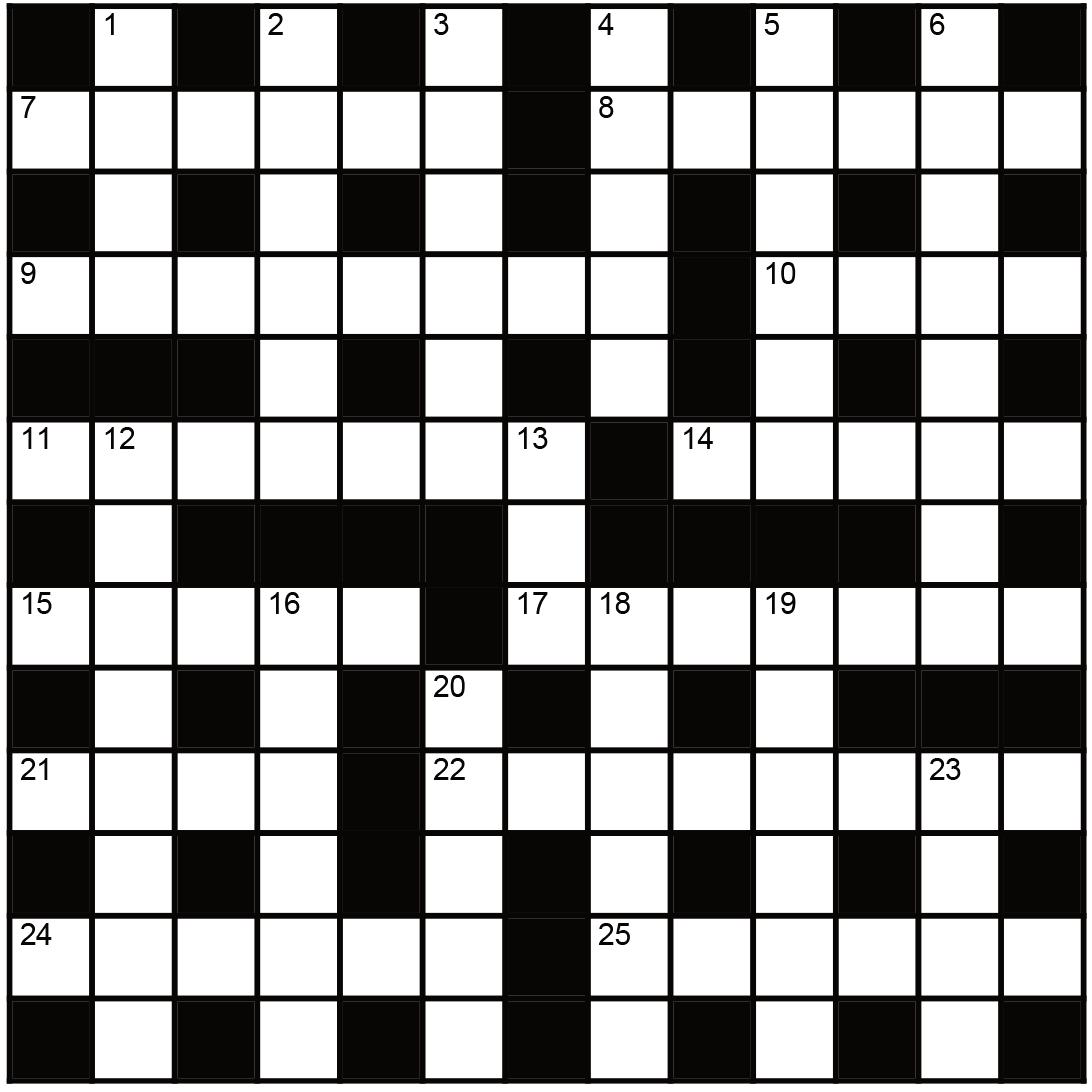
6 Day after Twelfth Night (8)
12 Theological doctrine that Jesus Christ had no human father (8) 13 Fluid container; bag (3)
16 Valley separating Temple Mount from the Mount of Olives (6)
18 Notable among the enemies killed by the Jews at Ahasuerus' citadel in Susa (6)
19 Protect; ward off (6)
20 Assegai, for example (5)
23 Biblical country in south-west Asia to the east of the Tigris River (4)